- Application Services
- GDS/XML/API Integration
- IT Consulting
- Support Services
- Travel Agency ERP Solution
- DMC – ERP Solution
- B2B Travel Portal
- Finance Module
- B2C Online Platform
- Corporate Booking Engine
- Hajj & Umrah Automation (Coming soon)
- Cloud Based DMC Solution (Coming soon)
- Case Studies
- Testimonial
- PR & Events


Company Overview Technology solutions to help businesses and societies flourish
Global Innovations is a leading Travel Technology & Solutions company, based in Dubai UAE, providing software solutions to DMCs (Inbound Operators), Travel Wholesalers (Outbound) and Travel Agents which enable them to fully automate their business processes. With the profound knowledge, expertise, skill set and proven record of last 17 years, we leverage not only the state-of-the-art IT services enabling the Travel Agencies and tour operators to enhance their global presence but also consulting services to streamline the internal business process in line with the industry’s best practices.
Serving customers from GCC countries Qatar, Saudi Arabia, Kuwait, Bahrain, Oman etc and worldwide alike, our products are well appreciated by the travel agencies located in various parts of the world, Asia-Pacific, CIS countries, Europe, Indian Subcontinent, Middle-East Northern Africa, Far East, Australia.
We are a cross-disciplinary team of Domain Experts, User Experience Designers , Software Engineers and creative technologists that provide elegant, cost-effective services to an international client base. We specialize in innovative, strategy-inspired Travel Technology Solutions proudly driven by our collaborative and transparent client relationships.
To become a Global trusted choice for Innovative, Accurate and hassle free Travel Technology Solutions Provider.
Our mission is to create value and impact for our clients to make them more competitive and align them with the fast pace business environment. We do it by attracting the right talent, advanced planning and with the right selection of technology at the right time.
Why Global Innovations?
Domain expertise.
17+ years of experience to provide and develop innovative solution for Travel Industry.
Vast Experience
40+ active clients across industry leaders in travels.
50+ Partners & Integrations
50+ Suppliers for hotel, car rentals, sightseeing / excursion / activities, transfers and travel Insurance.
Cost-effective Delivery Model
100+ plus implementation experience, We provide implementation in shortest time.
24×7 Support
Seamless delivery regardless of the time zone through round-the-clock operations
Industry Awards
Nominated for Best Travel ERP from 5 consecutive years
Submit your enquiry
- Discovery Platform
- Innovation Scouting
- Startup Scouting
- Technology Scouting
- Tech Supplier Scouting
- Venture Clienting
- Startup Program
- Trend Intelligence
- Business Intelligence
- All Industries
- Industry 4.0
- Manufacturing
- Case Studies
- Research & Development
- Corporate Strategy
- Corporate Innovation
- Open Innovation
- New Business Development
- Product Development
- Agriculture
- Construction
- Sustainability
- All Startups
- Circularity
- All Innovation
- Business Trends
- Emerging Tech
- Innovation Intelligence
- New Companies
- Scouting Trends
- Startup Programs
- Supplier Scouting
- Tech Scouting
- Top AI Tools
- Trend Tracking
- All Reports [PDF]
- Circular Economy
- Engineering
- Oil & Gas
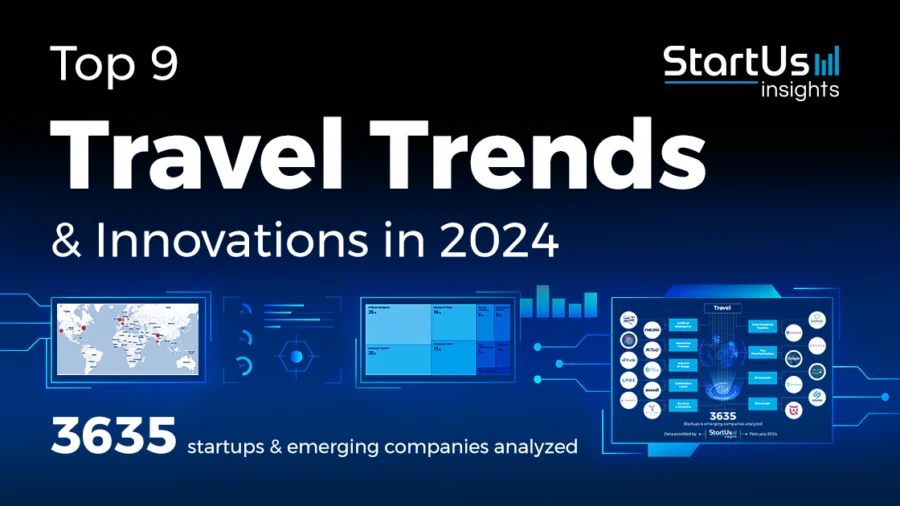
Share this:
- Click to share on Facebook (Opens in new window)
- Click to share on Twitter (Opens in new window)
- Click to share on LinkedIn (Opens in new window)
Top 9 Travel Trends & Innovations in 2024
How are the latest trends in the travel industry reshaping trip planning and enhancing tourist experiences in 2024? Explore our in-depth industry research on the top 9 travel trends based on our analysis of 3500+ companies worldwide. These trends include AI, immersive tourism, IoT, contactless travel & more!
Technological advancements in the travel industry meet the growing demand for personalized experiences, safety, and sustainability. Post the COVID-19 pandemic, emerging travel trends mark a shift towards contactless travel through digital payments, self-check-ins, and more. Additionally, artificial intelligence (AI), the Internet of Things (IoT), and blockchain are automating various hospitality and travel-related operations.
For instance, smart hotels make use of internet-connected devices to remotely control rooms. Further, businesses offer virtual tours by adopting extended reality (XR) technologies like virtual reality (VR) and augmented reality (AR). Travel companies also leverage data analytics to personalize marketing. At the same time, traveler assisting solutions like chatbots and voice technology aid them in booking accommodation and optimizing journeys. These travel trends improve the overall profitability of the tourism industry and enable it to make operations more sustainable and safe.
This article was published in July 2022 and updated in February 2024.
Innovation Map outlines the Top 9 Travel Trends & 18 Promising Startups
For this in-depth research on the Top 9 Trends & Startups, we analyzed a sample of 18 global startups and scaleups. The result of this research is data-driven innovation intelligence that improves strategic decision-making by giving you an overview of emerging technologies & startups in the travel industry. These insights are derived by working with our Big Data & Artificial Intelligence-powered StartUs Insights Discovery Platform , covering 2 500 000+ startups & scaleups globally. As the world’s largest resource for data on emerging companies, the SaaS platform enables you to identify relevant startups, emerging technologies & future industry trends quickly & exhaustively.
In the Innovation Map below, you get an overview of the Top 9 Travel Trends & Innovations that impact travel & tourism companies worldwide. Moreover, the Travel Innovation Map reveals 3 500+ hand-picked startups, all working on emerging technologies that advance their field.
Top 9 Travel Trends
- Artificial Intelligence
- Immersive Tourism
- Internet of Things
- Contactless Travel
- Big Data & Analytics
- Post-Pandemic Tourism
- Tour Premiumization
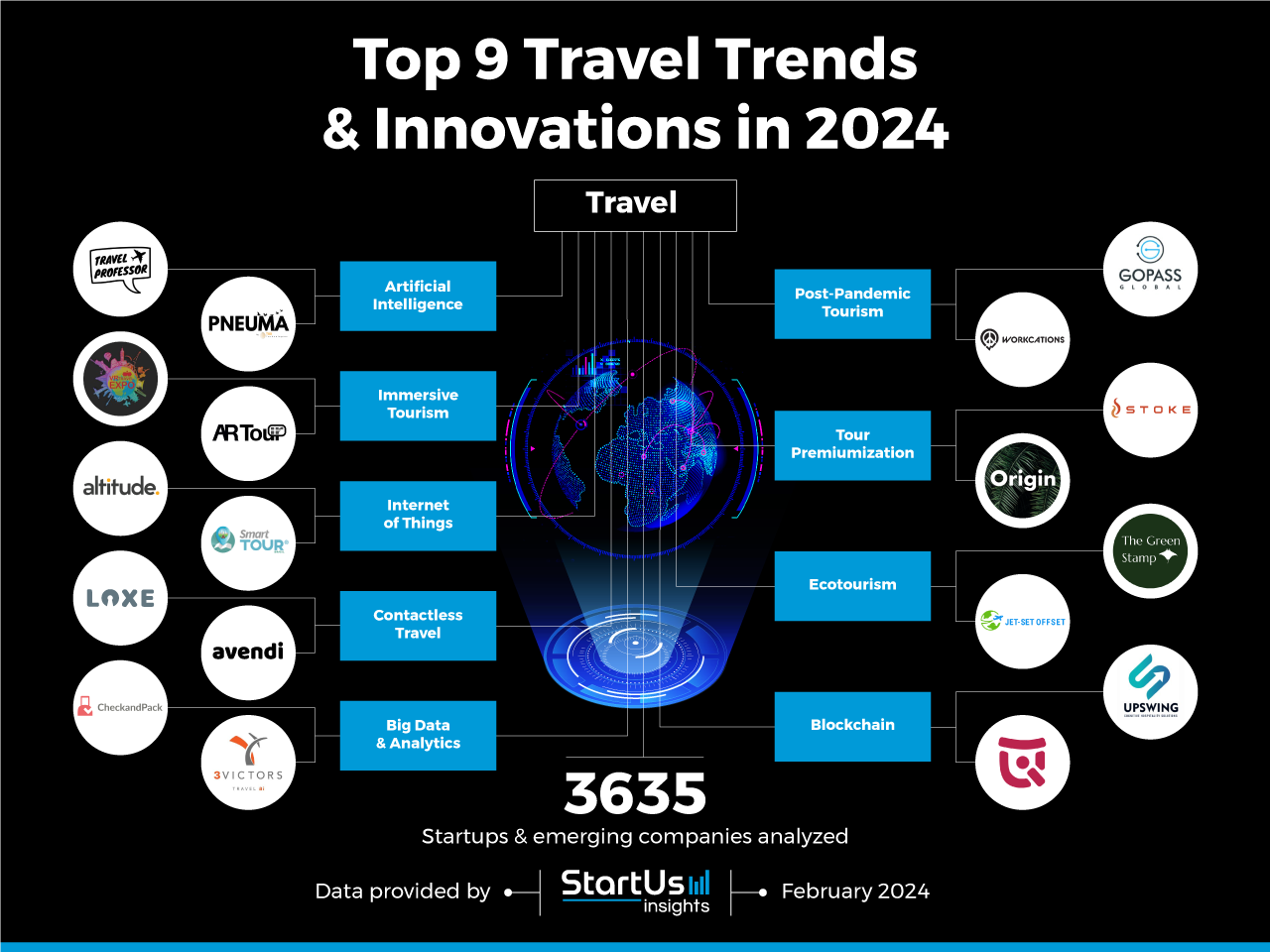
Click to download
Tree Map reveals the Impact of the Top 9 Travel Trends
Based on the Travel Innovation Map, the Tree Map below illustrates the impact of the Top 9 Travel Industry Trends in 2024. Startups and scaleups are enabling contactless travel using technologies like biometrics, radio-frequency identification (RFID), and near-field communication (NFC). This is due to increasing health and hygiene concerns post the pandemic. The use of AI in tourism ensures hassle-free trip planning while AR and VR allow tourists to virtually visit various locations and excursions. IoT increases visibility into tourism industry operations and allows passengers to track their luggage more efficiently. Further, the demand for personalized and luxurious travel is rising. Several startups enable recreational space travel as well as offer sustainable travel options to passengers.
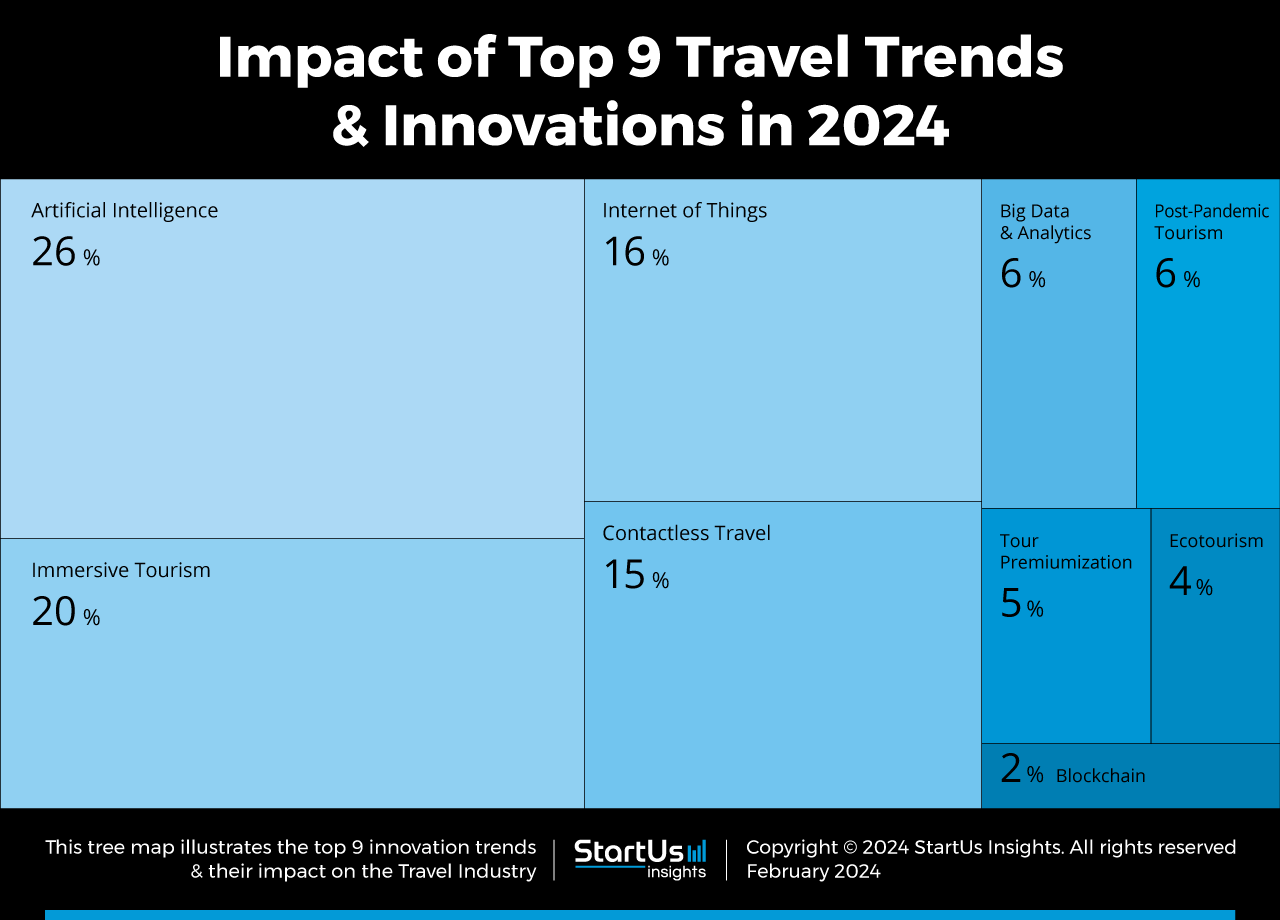
Global Startup Heat Map covers 3 635 Travel Startups & Scaleups
The Global Startup Heat Map below highlights the global distribution of the 3 635 exemplary startups & scaleups that we analyzed for this research. Created through the StartUs Insights Discovery Platform, the Heat Map reveals that the US, Europe, and India see the most activity.
Below, you get to meet 18 out of these 3 635 promising startups & scaleups as well as the solutions they develop. These 18 startups are hand-picked based on criteria such as founding year, location, funding raised, and more. Depending on your specific needs, your top picks might look entirely different.
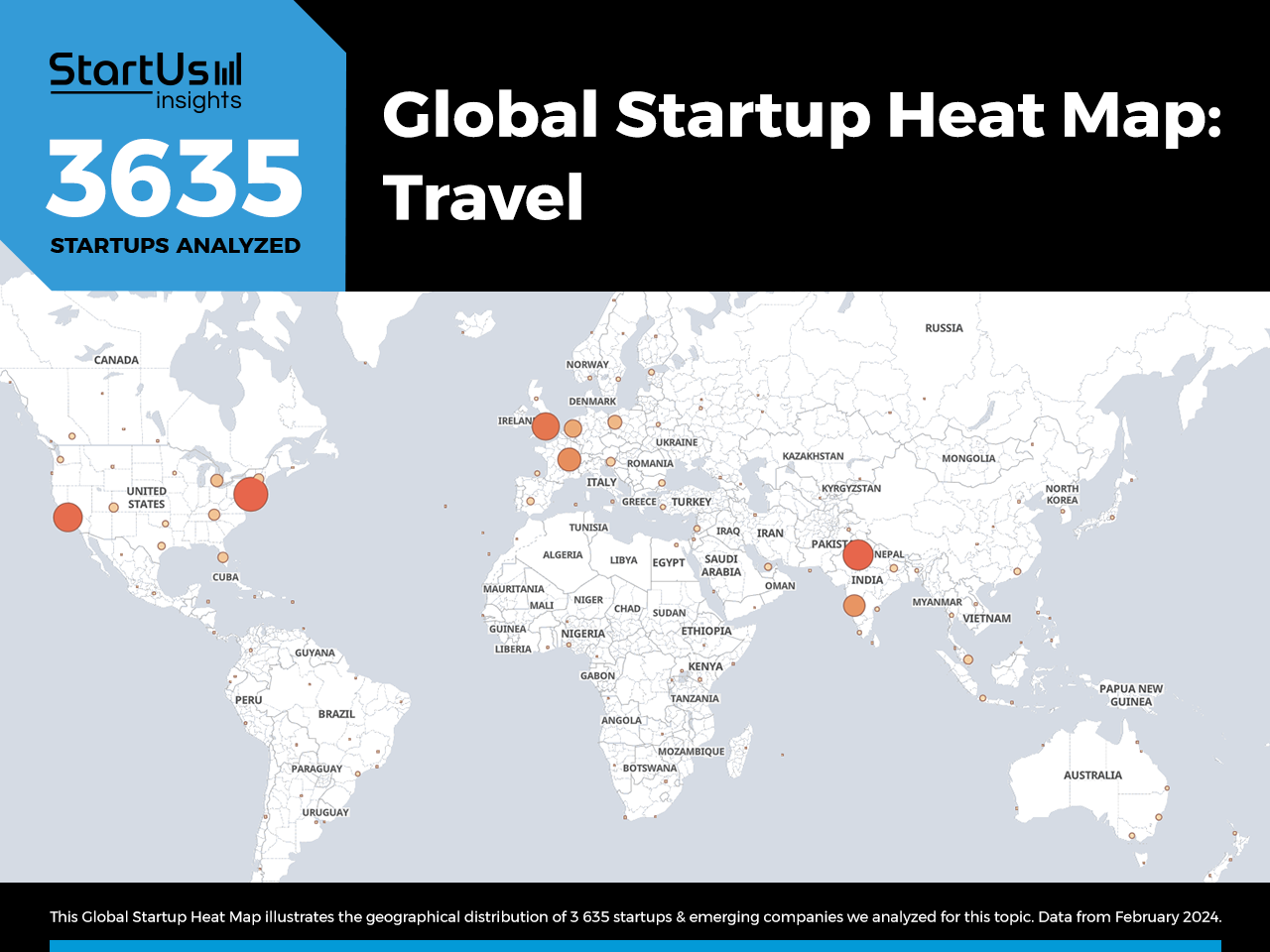
Interested in exploring all 3500+ travel startups & scaleups?
Top 9 Travel Trends in 2024
1. artificial intelligence.
Hotels employ intelligent chatbots, powered by AI, to provide quick and personalized responses to traveler inquiries. These chatbots simplify the booking process and gather customer reviews, aiding potential travelers in making informed decisions. Moreover, AI-based robots enhance the customer experience by automating hotel disinfection and delivering room service.
At airports, these robots guide travelers and assist with luggage handling. Facial recognition technology, driven by AI, expedites identity verification at airports, enhancing security and offering a swift alternative to traditional methods. Startups are developing AI-powered trip planning solutions, optimizing journeys, and personalizing travel experiences.
Travel Professor develops a Travel Chatbot
UK-based startup Travel Professor offers an AI-enabled chatbot for travelers. The startup’s chat widget software monitors multiple flight deals and notifies users when their preferences match. It also provides travel destination recommendations and flight price alerts. This allows travelers to book economical flights and have a budget-friendly tourism experience.
Pneuma Travel facilitates Travel Planning
US startup Pneuma Travel develops a voice-assisted digital agent, Sarah , to streamline the process of travel planning. This assistant, powered by AI, excels in arranging flight and accommodation bookings and assists travelers in discovering a variety of activities. Sarah , available round the clock, provides continuous support for all travel-related inquiries.
Moreover, Sarah customizes travel options according to individual preferences and budgetary constraints. The agent further enhances the travel experience by providing insights into local attractions in unfamiliar cities. Importantly, Sarah enables real-time modifications to travel plans, in compliance with specific airline policies, thereby minimizing waiting times for users.
2. Immersive Tourism
Immersive tourism caters to the growing demand for meaningful experiences among travelers, leveraging AR, VR, and mixed reality (MR). VR simulates original locations through a computer-generated environment, allowing tourists to virtually explore destinations. It provides travelers with a comprehensive 360-degree tour of points of interest.
AR enhances the travel experience with interactive elements such as navigation maps and ads. Travel companies employ AR and VR-based gamification to heighten tourist attractions. Moreover, these technologies enable hotels and resorts to present amenities and rooms in an engaging, interactive manner.
VR Travel Expo offers VR-based Travel Plans
US startup VR Travel Expo develops a VR travel application to transform the way people research and book travel. The application enables users to plan their vacations more efficiently. It provides an engaging platform for users to explore and expand their knowledge of the world. Moreover, it employs 3D geospatial technology that creates real-time digital twins of the world. This further enhances the travel planning experience.
AR Tour makes AR Glasses
Italian startup AR Tour offers AR-powered tours. The startup’s AR glasses superimpose reconstructed images of archaeological ruins to show how the site originally was. Its tour informs the tourists about the site’s history and significance via an audio-visual package. Moreover, the startup designs lightweight AR glasses to prevent motion sickness among tourists, improving convenience.
3. Internet of Things
IoT generates ample data that tourism companies leverage to personalize services in their subsequent visits. Hotels use IoT sensors to enable smart rooms that automate room lighting, temperature, and ambiance control, enhancing guest comfort. These sensors adjust appliances in vacant rooms, conserving energy and reducing the building’s carbon footprint.
Startups harness IoT to deliver location-specific information to customers, including real-time luggage tracking via IoT tags, minimizing lost items. Airlines also incorporate IoT-based solutions into seats, monitoring passenger temperature and heart rate for proactive health management.
Altitude enables Smart Hotels
New Zealand-based startup Altitude creates an IoT-based hotel software and hardware to develop smart hotels. The startup makes self-service kiosks to automate reservations, room up-gradation, payments, as well as check-in and check-out. Its hotel management platform further enables contactless engagement with guests. Additionally, Altitude’s mobile keys allow guests to open doors using mobile phones, providing convenience and saving time for travelers.
Smart Tour provides Smart Itineraries
Brazilian startup Smart Tour offers smart itineraries using IoT and quick response (QR) codes. The startup recommends travel routes and destinations based on the user’s preference in real-time. This facilitates a seamless experience for travelers. Besides, the user-generated data enables tourism managers to better understand consumer behavior and indulge in proximity marketing. The startup also offers a contact tracing solution to monitor COVID-19 infected travelers and ensure public safety.
4. Contactless Travel
Travelers benefit from contactless recognition technologies like retina scanning, which replace traditional travel documents, speeding up passenger identification and reducing airport queues. QR codes offered by travel companies allow tourists to access relevant information on their mobile devices, enhancing engagement.
Hotels have introduced contactless self-check-ins, enabling visitors to arrange services before arrival. Additionally, contactless payment modes are available in hotels and restaurants for swift and secure transactions. Moreover, wearable devices are transforming the travel experience by providing real-time notifications and touch-free access to services and information.
Loxe designs Smart Hotel Keys
US-based startup Loxe makes smart mobile keys for hotels. The startup’s smartphone app replaces key cards with contactless mobile keys that allow users to unlock doors using smartphones. It also reduces operational costs incurred in the manufacturing of conventional keys or plastic cards. Moreover, the startup designs a Bluetooth retrofit module that converts normal door locks into mobile-ready door locks. This allows hotel owners to easily convert their existing locks into smart ones without additional expenses while improving guest safety and convenience.
Avendi provides Contactless Payment
Singaporean startup Avendi offers contactless and cashless payments for travelers. The startup allows tourists to accumulate expenses throughout their trip and pay at the end of the journey. Avendi’s app utilizes QR codes to add all the billed expenses and shown through its dashboard. The user settles the tab amount in the preferred currency, preventing the inconvenience of cash withdrawal or credit card payments.
5. Big Data & Analytics
Big data empowers travel companies with customer trends for strategic marketing. Analyzing traveler behavior, they offer tailored recommendations for hotel bookings, cab hires, flight reservations, and ticket purchases.
Predicting future demand is another advantage of big data and analytics, helping hotels and airlines identify peak periods to optimize revenue. Advanced analysis of transactional data aids in detecting cyber fraud, and safeguarding sensitive customer information such as credit card details and biometric data.
CheckandPack creates a Travel Platform
Dutch startup CheckandPack offers a big data travel platform. It runs marketing campaigns to gather traveler data and understand tourism trends. Based on these insights, the platform enables businesses to approach travelers with a customized appeal. It also provides travelers with holiday planning.
3Victors provides Travel Data Analytics
US-based startup 3Victors offers travel data analytics. The startup’s product, PriceEye Suite , proactively monitors the prices of numerous airlines to provide insights into competitor prices. It creates a dashboard to display travelers’ location of interest, allowing travel airlines to better manage their revenue and pricing strategy.

6. Post-Pandemic Tourism
Post-pandemic tourism focuses on safe, sustainable, and flexible travel options, responding to evolving traveler preferences and health guidelines. Enhanced health and safety protocols, including regular sanitization and contactless services, become standard in airlines and hotels, ensuring traveler confidence.
Destinations and operators emphasize outdoor and less crowded experiences, catering to a heightened demand for nature-based and wellness travel. Flexible booking policies and trip insurance gain prominence, offering peace of mind amid uncertainties. Sustainable travel gains traction, with tourists and businesses prioritizing environmental impact and community well-being.
GOPASS Global enables Pre-travel Risk Management
Singaporean startup GOPASS Global provides a travel risk analytics platform against COVID-19. It analyzes the biosecurity risk elements involved in a trip, such as border restrictions, quarantine requirements, airport type, and airline transit points or seating in real-time. This allows travelers to assess risk factors and plan their trips accordingly.
Moreover, the startup creates world maps displaying information regarding COVID-prone areas, testing areas, and vaccine coverage. This provides travelers with a preview of the current situation, allowing them to ensure safety during business and leisure travel.
Workcations enables Work from Anywhere
Indian startup Workcations provides properties at tourist destinations for remote-working individuals. It offers amenities like internet connectivity, food, and a quiet ambiance, allowing tourists to work in a peaceful environment without hindrance. This increases employee productivity, motivation, and retention.
7. Tour Premiumization
Hyper-personalization in travel experiences is on the rise, with tourists eager to immerse themselves in diverse cultures. Luxury travelers enjoy tailored experiences and intuitive services through tour premiumization. Health and wellness packages offered by travel startups help tourists unwind.
These retreats enhance health and offer detoxifying food options. Space tourism is another exciting development, offering leisure or research trips to space. Lastly, travel startups are fostering customer loyalty and building strong relationships through membership or subscription models.
STOKE provides Space Tour
US-based startup STOKE facilitates space travel using everyday-operable rockets. The startup’s rockets are reusable and deliver satellites to any desired orbit. This enables on-demand access to space, paving way for space tours for exploration, recreation, and research. The startup also emphasizes the economical and rapid development of its hardware for feasible spacecraft launches, advancing space tourism.
Origin offers Travel Personalization
Dutch startup Origin provides premium travel personalization to tourists. The startup utilizes machine learning and travel curators to plan creative vacations. It also arranges flights and accommodation for travelers. Further, the startup measures the carbon output of itineraries and offers sustainable tourism options.
8. Ecotourism
Traveling responsibly minimizes tourism’s environmental impact and supports local communities’ well-being. Ecotourists strive to reduce their carbon footprint during their journeys. Startups contribute by developing sustainable transport, ecolodges, and solar-powered resorts.
Airline passengers have the option to offset carbon emissions during flight bookings. Local tourism stimulates small businesses economically and creates job opportunities. It also emphasizes minimum littering, which lowers pollution and the time spent on cleanups.
Jet-Set Offset simplifies Flight Carbon Offset
US-based startup Jet-Set Offset creates a carbon-offsetting platform for air travel. The startup partners with non-profit organizations working against climate change and connects them with travelers. Each time travelers book flight tickets via the startup’s platform, Jet-Set Offset contributes a certain amount per mile for their journey to environmental organizations. This way, the passenger’s journey promotes mileage-based donations to offset carbon emissions.
The Green Stamp facilitates Ethical Wildlife Tour
Dutch startup The Green Stamp provides a platform to book ethical wildlife tours. It curates tours based on the tourists’ inclinations toward certain locations or wildlife. Exploration of these projects allows travelers to indirectly contribute to their cause as these wildlife projects donate to the welfare of local communities and the environment.
9. Blockchain
Blockchain provides the travel industry with operational transparency and security. Traceable payments, particularly for international travel, are a key application, that fosters trust among parties involved in transactions.
Automation and enforcement of agreements in travel insurance and supplier contracts are achieved through smart contracts. This strengthens reliability and cuts administrative costs. Travel firms establish customer loyalty programs where points are exchanged for cryptocurrency. Lastly, blockchain increases data storage security, reducing the risk of information leaks.
Upswing facilitates Guest Profiling
Indian startup Upswing creates AURA , a blockchain-powered platform for guest profiling. It provides a holistic view of guests, their preferences, and purchase patterns. The platform associates a score with each guest and suggests improvements in their service. This facilitates hotels to provide a personalized experience to their guests and, in turn, increase sales.
UIQ Travel develops a Solo Traveling App
US-based startup UIQ Travel develops a blockchain-based app to connect solo travelers. It discovers people with shared interests and suggests tours or attractions. Such hyper-personalized recommendations assist in experience discovery and also increase traveler engagement.
Discover all Travel Trends, Technologies & Startups
Tourism, although severely impacted by the pandemic, now continues to rapidly grow across the globe. Post-pandemic trends indicate an increasing emphasis on hygiene and safety during travel. The industry is witnessing the widespread adoption of disruptive technologies like AI, XR, IoT, and blockchain. The travel industry utilizes big data to understand traveler trends for targeted marketing. The transition to ecotourism is accelerating as businesses integrate zero-emission transit and carbon offset programs to reduce their carbon footprint.
The Travel Trends & Startups outlined in this report only scratch the surface of trends that we identified during our data-driven innovation and startup scouting process. Among others, personalization, decarbonization, and travel safety will transform the sector as we know it today. Identifying new opportunities and emerging technologies to implement into your business goes a long way in gaining a competitive advantage. Get in touch to easily and exhaustively scout startups, technologies & trends that matter to you!
Your Name Business Email Company
Get our free newsletter on technology and startups.
Protected by reCAPTCHA and the Google Privacy Policy and Terms of Service apply.
Discover our Free Travel Report 21 pages
Book a call today!
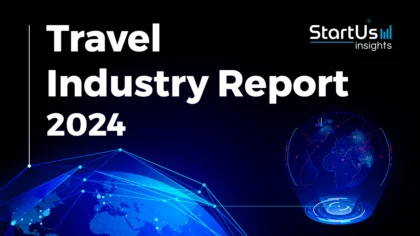
Travel 21 pages report
Mobility 22 pages report, railway 22 pages report, cleantech 20 pages report.
Leverage our unparalleled data advantage to quickly and easily find hidden gems among 4.7M+ startups, scaleups. Access the world's most comprehensive innovation intelligence and stay ahead with AI-powered precision.
Get in touch
Your Name Business Email Company How can we support you? (optional)
Business Email

Protected by reCAPTCHA and the Google Privacy Policy and Terms of Service apply.
- Get in touch
Global Travel Tech is revolutionizing travel. We unite leaders in travel to help decision-makers harness the power of technology to provide traveler-centric solutions based on transparency and sustainability.
- Our mission
Empowering Travelers through Innovative Tech Solutions
Powered by the latest data and insights, this report offers a comprehensive look at the value travel intermediaries deliver across the travel and tourism ecosystem.
Latest news
[press release] leading travel tech companies unite to create new global travel tech.
The new trade association will advocate for global policy solutions to drive growth and foster competition across the travel and tourism ecosystem.
Empowering Global Travel Through Tech Innovation
In the dynamic world of travel and tourism, technology has emerged as a powerful catalyst for change.
Global Travel Tech is launching at ITB Berlin
On 5 March, we are discussing technology’s role in connecting sustainable travel options with a growing audience of eco-conscious travelers. Right after, we are officially launching Global Travel Tech during a festive lunch talk. Make sure to stop by!
(Re)watch 'unlocking sustainable travel through technology'
Global Travel Tech members and industry insiders discuss how innovative technologies can unlock sustainable travel.
Enabling coordinated policy
Global Travel Tech aims to be a constructive partner in global industry and policy discussions to ensure a sustainable and competitive travel industry.
National Geographic content straight to your inbox—sign up for our popular newsletters here

5 pandemic tech innovations that will change travel forever
These digital innovations will make your next trip safer and more efficient. But will they invade your privacy?
In the 20 months since the COVID-19 pandemic began, technological innovations have gone from futuristic to familiar. These days it’s hard to be out in the world without encountering QR-coded menus or supplying digital vaccine passports.
As the tourism industry—which logged a billion fewer international arrivals in 2020 than 2019—sputters back to life, masks may begin to disappear, but many pandemic-era tech tools will continue to factor into your trips.
“Consumers will come to expect technologies that make them more confident about travel,” says Steve Shur, the president of the Travel Technology Association. “Some of these changes are here to stay.”
In fact, a 2021 Pew Research survey of 915 policy leaders, science researchers, and other experts predicts that, by 2025, our daily lives could be even more influenced by algorithms, remote work, and what some call “tele-everything.”
While novel interventions such as real-time translation devices and facial recognition passport control may make travel safer and more efficient, there are downsides, including concerns about privacy , data security, and biased technology. Here are some of the innovations that travelers will continue to see and use.
Virtual and augmented reality
When the pandemic shut down travel, museums and tourist destinations turned to augmented reality (AR) and virtual reality (VR) to create online exhibits and experiences. While some of these experiences are best seen with a VR headset, most can be enjoyed with just a computer or smartphone.
The Xplore Petra app launched in June 2020, allowing users to “visit” Jordan ’s most iconic archaeological site by projecting a scaled-down version of the ruins. Lights over Lapland, an Arctic travel company, launched a VR experience to show off the Northern Lights using VR headsets or computer screens.
( How virtual reality might change your next trip, even after COVID-19. )
Post-pandemic, VR and AR may enhance actual trips by adding experiences such as a simulated climb up the Matterhorn at Lucerne’s Swiss Museum of Transport . The Hunt Museum in Limerick, Ireland, has a VR attraction in which visitors immerse themselves in “ The Garden of Earthly Delights ,” a 500-year-old painting by Hieronymus Bosch.
The Museum of Natural History in Paris has an AR exhibit that brings visitors face to face with extinct animals in digital form. The National Museum of Singapore has an installation called “Story of the Forest,” where sightseers explore a virtual landscape comprised of almost 70 nature drawings from the museum collection. The Smithsonian Institution’s National Museum of Natural History , in Washington, D.C., has an app that uses AR to show what some of its animal skeletons would look like with skin and muscle over the bones, offering a new view of a collection dating back to the 1880s.
“VR is not going to replace travel and tourism. It is just going to enhance tourism,” says Anu Pillai, who runs the Digital Center of Excellence at Wipro, a technology company.
Crowd control
To help enforce social distancing, cities, airports, and museums tested or rolled out crowd-control technology including Singapore’s roaming, vaguely terrifying robots that announce people are too close together and signs indicating how large crowds are at airport gates . As throngs of travelers return to popular destinations, similar methods and devices may be implemented to prevent overtourism.

In Italy during the pandemic, Venice began tracking visitors using cameras designed to catch criminals. Post-pandemic, it plans to harness them to keep tourist numbers at manageable levels, perhaps in concert with the mayor’s proposal to add electronic gates at major entry points (cruise ship docks, train stations) that can be closed if the city gets overcrowded.
(These tech changes could make your next flight safer.)
“We know minute by minute how many people are passing and where they are going,” Simone Venturini, Venice’s top tourism official, told the New York Times . “We have total control of the city.”
Amsterdam , which also struggles with overtourism, tracks how visitors use Amsterdam’s City Card, a flat-fee pass to museums and public transport. Beach Check UK launched this summer with real-time information on how busy dozens of beaches are along the English coast, guiding travelers away from packed areas.
“Technology can be used to collect data in order to both make better decisions and communicate those decisions,” says Christopher Imbsen, director of sustainability at World Travel & Tourism Council.
UV-C cleaning
Hospitals have used UV-C light to disinfect and kill viruses for more than two decades. Now, indoor public spaces including airports, gyms, and movie theaters are adding UV-C to halt viral spread.
“UV-C is having its heyday right now,” says Peter Veloz, CEO of UltraViolet Devices, which makes UV disinfecting technology.

UV-C has germicidal properties that combat COVID-19 and other nasties, both in the air or on surfaces. Depending on the location, new UV-C installations go into HVACs, on escalator handrails, or through airports and planes via light-equipped robots that disinfect as they go.
If installed and operated correctly, a UV-C system can kill all sorts of bacteria and germs. Even seasonal flu bugs might be zapped before they spread. “COVID-19 could come and go, but what won't disappear are normal pathogens,” Veloz says.
QR codes at restaurants
In the early days of the pandemic, when transmission of the COVID-19 wasn’t yet well understood, restaurants hurried to provide QR codes. The little black boxes of pixelated dots and dashes could be scanned with a smart phone to bring up a menu, let you order from it, and then allow you to pay your bill, all with limited virus-spreading interactions with servers.
While earlier fears that people could catch the virus via menus and other surfaces have been disproven, the codes have proven convenient and will probably stick around, especially with late-pandemic worker shortages.
Such convenience might mean a trade off with privacy, however, since the little codes can potentially gather a large amount of information from users. Some QR programs just take a food order, but others mine data like a patron’s dining history, age, and gender. The restaurant could use that info to send them coupons or event invitations—or sell it to third parties.
“It’s an example of companies exploiting COVID-19 to extend tracking,” says Jay Stanley, a senior policy analyst at the ACLU. “Moving everything to mobile opens people to new ways of tracking and control.”
Travelers should know that QR codes can be hacked; you might scan one, place a dinner order, and wind up compromising your credit card instead. Stanley recommends treating QR codes just as you do links in unknown emails. Either use your phone to look up the restaurant’s menu on the internet or install a protective app like Kaspersky QR Scanner , which will give users a warning if the code isn’t safe.
Contact-tracing tools
Public health groups used contact tracing methods to identify and track down people who were potentially exposed to infectious diseases such as Zika and HIV, and offer counseling, screening, and treatment. These traditional tools were usually based on phone calls to ask individuals about who they were in contact with and to continue researching exposure. The pandemic pushed officials to scale up such efforts and implement new, higher-tech ones to track viral spread and provide information.
For instance, Apple and Google added contact-tracing functions to new smartphone software, allowing users to opt in and get alerts if they come into close contact with an infected person.
(If you must travel during a pandemic, here’s how to protect your health.)
“There’s been a strong recognition about the value of and the important role of contact tracing for infectious disease prevention and control,” says Elizabeth Ruebush, a senior analyst for infectious disease and immunization policy at the Association of State and Territorial Health Officials. “But we’ve never seen it implemented at the scale of COVID-19.”
Other technologies, such as automated texts, viral heat maps and even CCTV with facial recognition could help track other infectious illnesses or make us ready for the next pandemic.
Even with fancy new apps, however, phone calls and personal outreach will still be at the center of public health. “These tools are aimed to enhance, but not replace, traditional contact tracing,” Ruebush says.
COVID-19 has sped up our adoption of technology . The downside is that this may make it even harder to turn off smartphones while on vacation. Then again, wanderlust is now stronger than ever—and getting lost in the moment still hasn’t been harnessed by a digital code.
Jackie Snow is a Washington, D.C.-based writer specializing in travel and technology. Follow her on Instagram .
Related Topics
- INFORMATION TECHNOLOGY AND TELECOMMUNICATIONS
- SCIENCE AND TECHNOLOGY
You May Also Like
Digital mapmaking innovations are revolutionizing travel

New tools offer peace of mind for pandemic travel
Fuel their curiosity with your gift.

The uncanny valley, explained: Why you might find AI creepy

How is your location data really tracked? You’d be surprised.

It’s harder than ever to identify a manipulated photo. Here’s where to start.

Would you travel by flying taxi? Here's everything you need to know

How pulling carbon out of the ocean may help remove it from the air
- Environment
History & Culture
- History & Culture
- History Magazine
- Race in America
- Mind, Body, Wonder
- Destination Guide
- Terms of Use
- Privacy Policy
- Your US State Privacy Rights
- Children's Online Privacy Policy
- Interest-Based Ads
- About Nielsen Measurement
- Do Not Sell or Share My Personal Information
- Nat Geo Home
- Attend a Live Event
- Book a Trip
- Inspire Your Kids
- Shop Nat Geo
- Visit the D.C. Museum
- Learn About Our Impact
- Support Our Mission
- Advertise With Us
- Customer Service
- Renew Subscription
- Manage Your Subscription
- Work at Nat Geo
- Sign Up for Our Newsletters
- Contribute to Protect the Planet
Copyright © 1996-2015 National Geographic Society Copyright © 2015-2024 National Geographic Partners, LLC. All rights reserved

Preview: Travel Innovation and Technology Trends 2023
A preview of the most significant innovation trends in travel technology and distribution for 2023.
By Phocuswright Research

Introduction
As the world fully reopens in the wake of the COVID-19 pandemic, the travel industry can once again focus its attention squarely on the future. While significant challenges remain (i.e., inflation, recession, staffing, international conflict), it’s a good time to place strategy and competitive edge-building at the forefront.
Each year, Phocuswright's expert analysts identify the technology and innovation trends that will influence travel significantly in the coming year and beyond. This year, we’re exploring the growing roles of social media and Web3 in travel, addressing the realities of sustainability and our fragmented technology landscape, and pondering the impact of the next game-changing technologies like generative AI and eVTOLs.
This overview article is a preview of the full report , which features brief introductions to the eight trends that we will cover in the coming months. Stay tuned for each full trend analysis, and for details on a late spring/early summer webinar in which we’ll discuss these trends live.
The Future of Social Media, Influencers and Social Commerce in Travel
Web3 is proving itself in travel .
- Green Travel Innovation Now (Yes, Now!)
Selling Travel Is Hot Again – Even If You’re Not a Travel Company
Glimpsing the future: chatgpt, generative ai and travel .
- Regime Change in Digital Hotel Operations
- eVTOLs in Travel: Viable Addition or Flights of Fancy?
Super Apps’ Secret Sauce
By Robert Cole
Efficient direct-to-consumer marketing has been the goal of travel industry marketers since the dawn of the internet. Intermediaries may create value by cost effectively expanding brand reach, but they rarely enhance the brand-customer relationship in a manner superior to the brand itself.
According to one projection, U.S. social commerce surpassed $45 billion in 2022 and will reach nearly $80 billion in 2025, growing its share of total e-commerce sales to 5.2%.
Social commerce – in which merchants sell products directly through social media platforms without involving another e-commerce environment – is a key strategy for direct consumer engagement. According to one projection, U.S. social commerce surpassed $45 billion in 2022 and will reach nearly $80 billion in 2025, growing its share of total e-commerce sales to 5.2%.
The forthcoming report will focus on:
- How influencer-driven social commerce differs from traditional paid advertising
- Sponsorship and affiliate marketing methods typically employed throughout the social media landscape
- Influencer communities
The future of influencer-driven social commerce represents a significant opportunity for a travel industry striving to develop direct distribution channels, nurture loyalty and improve marketing efficiency.
Image captions

By Norm Rose
After years of hype surrounding blockchain and Web3 technologies, 2023 promises to be the year when Web3 starts providing measurable value to the travel industry. This is both a revolutionary and evolutionary change that will eventually impact all players in the travel ecosystem.
- Separating the hype from true business impact
- Reviewing the landscape
- Adopting Web3 across the industry
- A closer look at the Web3 startup space and innovative companies, highlighting their unique contributions to the space
- An evaluation of how traditional industry players are viewing Web3 technologies, with an eye to understanding how the mainstream travel industry will adopt Web3
- A review of multiple sectors of the industry, including air and hotel distribution, short-term vacation rentals, ride sharing, payment, settlement, social travel and loyalty
The focus will be less on these companies’ future capabilities, and instead evaluate the real-world impact these companies have today.
Green Travel Innovation Now (Yes, Now!)
By Cathy Schetzina Walsh
Facing mounting pressure to enact measurable change, travel companies must move beyond greenwashing and halfhearted environmental efforts.
The industry can either accept the challenge to make real change and become more sustainable via innovation – or be forced to do so via crises, regulation and traveler demand.
- Several new initiatives launched by travel companies and destinations
- How individual travel companies are shifting towards renewable energy sources
- How travelers – particularly younger travelers – increasingly consider environmental impact when making travel plans
Travel companies must innovate now to establish green infrastructure, leverage data and influence traveler behavior to shift the industry towards green energy sources and preserve tourism for future generations. There are many challenges along this path. Stay tuned for more on what’s realistic, what’s not and what needs to happen to effect meaningful change.

By Lorraine Sileo
Non-travel brands, such as financial institutions, retailers and loyalty clubs must really want to get into the travel business. Over the past 18 months, several have launched travel booking platforms or announced ambitious plans to do so, even though the online travel agency market is already consolidated and highly competitive. Will they succeed? If so, what are their advantages and what will be the impact on the marketplace?
If travel is best left to the big travel portals, then why are so many other entities jumping in?

If travel is best left to the big travel portals, then why are so many other entities jumping in? First, it’s easy to resell travel, considering the plug-and-play options offered by Expedia for Business, Rocket Travel (Booking.com), Hopper Cloud and others. And though non-travel brands’ travel gross bookings are tiny (earned commissions), the benefits can be big in terms of generating value and customer loyalty (e.g., Costco Travel, BJ’s Travel, AARP Travel Center).
- How these developments put a whole new spin on online travel – creating pockets of loyalty across myriad brands
- How they compare to giant OTAs
- How they signal a shift in consumer behavior
“The travel industry can use generative AI in a variety of ways …” At least according to ChatGPT , the free chatbot from OpenAI that made its public debut in November 2022 (see figure below). Since its launch, ChatGPT has attracted massive attention as the world gets a taste of AI’s creative potential. But while the technology does have applications for travel, it comes with a number of challenges that must be addressed before generative AI can have a substantial impact on the industry.

- Why generative AI is an area that travel companies should follow closely
- Why ChatGPT marks a substantial step forward
- Speed of advancement and potential pitfalls

Regime Change in Digital Hotel Operations
By Adam Glickman, VP Brand Strategy, Actabl and Dmitry Koltunov, Co-founder, ALICE
Hoteliers have typically looked at past performance and results to help forecast the future. They painstakingly analyze historical data to develop budgets, plans and goals. It’s been quite a simple approach, really: look back to compare in order to look forward and plan.
Real-time data is the “beating heart” that forward-looking plans flow through, and which allows hoteliers to maximize profits while optimizing guest experiences.

But as we move on from COVID and “revenge travel” and adapt to changing travel patterns for business, leisure and group, it’s time to consider a new approach in the context of labor shortages and inflationary pressures. It is essential to develop a strategy that puts real-time data analysis at the core of a plan to manage the business. Real-time data is the “beating heart” that forward-looking plans flow through, and which allows hoteliers to maximize profits while optimizing guest experiences.
- Several novel data-centric approaches to optimize operating performance in new and powerful ways
- Forward-looking demand data that can help enable precise scheduling and staffing
- How sales pace and sales leader performance data can uncover market-wide trends and individual performance management opportunities
- Identifying operational functions that can be automated, freeing up team members to deliver more personalized services to more guests
- Predicting new ancillary revenue sources by evaluating changing guest behavior patterns for each market where hotels operate
- Reviewing target Hours of labor Per Occupied Room (HPOR) for various segments and providing recommendations for using benchmarks to forecast labor costs
EVTOLs in Travel: Viable Addition or Flights of Fancy?
By: Hollis Thomases
EVTOLs, the acronym for Electric Vertical Take Off and Landing aircraft (pronounced “ee-vee-tolls”), have been in development for over a decade. Heralded as a greener solution to fossil fuel-powered short-haul planes, helicopters and roadway-clogging cars, eVTOLs will likely service intracity and city-to-city travel. The ecosystem is commonly referred to as Urban Air Mobility (UAM) or Urban Air Transportation (UAT).
While the applications of eVTOLs are broad and have previously been categorized into areas such as cargo, emergency medical or inspections, Phocuswright’s forthcoming analysis will focus on passenger transportation.
In the past 18 months, United, American, Virgin Atlantic and Delta have each invested in and/or made deal commitments to one or more eVTOL companies.
- Addressing carbon emissions and climate change
- Collaboration and access to data and technology
- Improving the passenger/travel experience
- Mindshare, relevancy and branding
- Broadening of accessible markets
To flourish, eVTOLs must overcome concerns regarding short-term hindrances. Some of these key pain points include safety issues, significant legal and governing issues, certification of vehicles and pilots, public perception and adoption, sustainability, and infrastructure constraints.

What do Google, Meta, Twitter, Hopper, Booking.com, PayPal and Uber have in common? All are Western companies with their sights on becoming super apps in the vein of Asia’s all-in-one mobile powerhouses. Apps like WeChat and AliPay in China, Grab (Singapore), PayTM (India), GoTo (Indonesia), Kakao (South Korea) and AirAsia (Malaysia) have all built addictive multi-service apps that dominate their respective markets.
While different market conditions from region to region are not replicable, there are strategic lessons to be learned from the apps themselves.

It remains to be seen whether companies can replicate the level of super app success seen in Asia Pacific (and more recently, in Africa and Latin America) in Western markets like the U.S. and Europe. But you don’t have to build a full-fledged unicorn super app to capture some of the benefits that have made these platforms an essential part of daily life for Asian consumers.
While different market conditions from region to region are not replicable, there are strategic lessons to be learned from the apps themselves:
- Multiple services
- Daily usage
- Social networking
- Gamification
- What can be learned from successful super apps to make travel offerings stickier and more appealing
- Whether a travel company aspires to super app status or not
The overview article features full introductions to the eight trends that we will cover in the coming months.
Watch the online event that covered each trend, presented by Phocuswright analysts:

WEEKLY RESEARCH INSIGHTS
We dig deep to give you the data and trends that drive the travel, tourism and hospitality industry.
Get the latest in travel industry highlights with our free weekly research articles and more. Sign up to get the latest delivered directly to your inbox.
FOR MORE INSIGHTS
See all of Phocuswright's free research insights here .
Sign up to get the latest delivered directly to your inbox.
Open Access Research Subscription
Research is our priority. Our Open Access research subscription puts the world’s most comprehensive library of travel research and data visualization at your fingertips.
Clients have relied on Phocuswright's deep industry knowledge for over 25 years to power great decisions, help justify a pitch, build a strategic plan and elevate any presentation through trusted research and data. When companies and executives reference Phocuswright, they gain the trust of an industry keen on data, trends and analytics.
See the full benefits of an Open Access subscription here .
- English (UK)
- English (CA)
- Deutsch (DE)
- Deutsch (CH)

10 Most impactful travel technology companies in 2024
1. travelperk.
- Headquarters: Barcelona, Spain
- Other office locations: London, Birmingham, Edinburgh, Berlin, Chicago, Boston, Miami
- Number of employees: 1,200
- Funding: Raised a total of US $513 million
?)
Ready to revolutionize your business travel management? Simply book a demo and we'll show you how.
2. getyourguide.
- Headquarters: Berlin, Germany
- Other office locations: 18 global offices, including Vienna, Bangkok, New York City, Dubai, and more
- Number of employees: 700+
- Funding: Raised a total of US $878 million over 11 rounds
3. Tripadvisor
- Headquarters: Needham, Massachusetts, United States of America
- Other office locations: 18 global offices, including New York City, London, Milan, Seoul, Sydney, Tokyo, and more
- Number of employees: 2,845
- Funding: Raised a total of US $303.3 million over 5 rounds
4. Booking.com
- Headquarters: Amsterdam, Netherlands
- Other office locations: Manchester, Tel Aviv, Singapore, New York, Shanghai
- Number of employees: 23,600
5. Hotel Engine
- Headquarters: Denver, Colorado, USA
- Other office locations: Glendale, Colorado
- Number of employees: 500+
- Funding: Raised a total of US $81 million over 2 rounds
6. Lighthouse (formerly OTA Insight)
- Headquarters: London, UK
- Other office locations: Singapore, Ghent, Berlin, London, Dallas, Denver, Sydney
- Funding: Raised a total of US $115 million over 6 rounds
- Headquarters: San Francisco, California, United States of America
- Other office locations: Los Angeles, New York City, Berlin, Paris, and more
- Number of employees: 6,907
- Funding: Raised a total of US $6.4 billion over 30 rounds
8. Blablacar
- Headquarters: Paris, France
- Other office locations: Madrid, Warsaw, Kyiv, São Paulo
- Number of employees: 600
- Funding: Raised a total of US $565 million over 11 rounds
9. Timeshifter
- Headquarters: Water Mill, New York, USA
- Other office locations: Southampton, New York, USA
- Number of employees: 11-20
- Funding: Raised a total of US $4.9 million over 3 rounds
- Other office locations: Prague, Beijing, London, New York
- Number of employees: 300
- Funding: Raised a total of US $480 million over 8 rounds
Travel tech makes booking travel easy
?)
Simplify your business travel management. Once and for all.
?)
Make business travel simpler. Forever.
- See our platform in action . Trusted by thousands of companies worldwide, TravelPerk makes business travel simpler to manage with more flexibility, full control of spending with easy reporting, and options to offset your carbon footprint.
- Find hundreds of resources on all things business travel, from tips on traveling more sustainably, to advice on setting up a business travel policy, and managing your expenses. Our latest e-books and blog posts have you covered.
- Never miss another update. Stay in touch with us on social for the latest product releases, upcoming events, and articles fresh off the press.
?)
The 10 best corporate meeting venues in the USA
?)
5 best corporate travel management apps
- Business Travel Management
- Offset Carbon Footprint
- Flexible travel
- Travelperk Sustainability Policy
- Corporate Travel Resources
- Corporate Travel Glossary
- For Travel Managers
- For Finance Teams
- For Travelers
- Thoughts from TravelPerk
- Careers Hiring
- User Reviews
- Integrations
- Privacy Center
- Help Center
- Privacy Policy
- Cookies Policy
- Modern Slavery Act | Statement
- Supplier Code of Conduct
- Starting a Business
- Growing a Business
- Small Business Guide
- Business News
- Science & Technology
- Money & Finance
- For Subscribers
- Write for Entrepreneur
- Tips White Papers
- Entrepreneur Store
- United States
- Asia Pacific
- Middle East
- South Africa
Copyright © 2024 Entrepreneur Media, LLC All rights reserved. Entrepreneur® and its related marks are registered trademarks of Entrepreneur Media LLC
How Generative AI Is Revolutionizing the Travel Industry GenAI won't displace travel agents; instead, it will enhance their efficiency, enabling them to focus on crafting tailored experiences that resonate with travelers on a deeper level.
By Alex Goryachev Edited by Chelsea Brown Jun 24, 2024
Key Takeaways
- Generative AI is transforming the travel industry by enhancing capabilities in areas like personalized marketing, predictive pricing and itinerary planning.
- Small businesses, particularly Tour Operators and Destination Management Companies, can leverage GenAI to significantly enhance their market power and agility as it enables them to offer highly personalized travel experiences that larger companies may struggle to match.
- Travel industry leaders are enthusiastically adopting GenAI, recognizing its potential to enhance their services and operations — however, successful implementation requires developing AI literacy and systematically integrating the technology into their processes.
Opinions expressed by Entrepreneur contributors are their own.
If you're in the travel industry, you already know that nearly everything you do is driven by the constant need to innovate. In the past, that need has been driven by a variety of market forces and inventions, from more extensive road networks and advances in ships and jets to online booking and dramatic changes forced by the Covid-19 pandemic.
Generative AI is the latest major innovative force, and it can't be ignored. It's changing the way large and small companies do their travel business, and GenAI has supercharged an already hypercompetitive industry to a new level of overdrive. Change in the travel industry is constant, and AI is accelerating it beyond what anyone can imagine, even industry experts.
Learning new things and transforming business operations always means a series of challenges and issues, but GenAI also represents an amazing opportunity that goes well beyond the simplistic "innovate or die" aphorism. This technology simply can't be ignored, and that's especially true for smaller businesses — they need to embrace GenAI early and make sure they do it the right way.
Related: The Power of AI in Travel: A Look at How Artificial Intelligence is Shaping the Future of Tourism
Disruption in the travel industry: Your trip will soon be driven by generative AI
While some industries were blindsided by the incursion of AI into traditional best practices, that's not the case with the travel industry at all. Travel leaders have already had to integrate personalized marketing, predictive pricing, deep analytics and ecommerce into the way they do their work. But generative AI is adding powerful new capabilities in all of these areas, not to mention new ones that are exponentially more impactful.
Take online itinerary planning. It's been available for some time now, but existing versions seem almost primitive compared to what GenAI is capable of creating. Established companies like Kayak and Expedia have been experimenting with online itinerary planning for some time, and new products and features are being added on a near-daily basis.
Let's use the example of planning a trip to a new destination. Plug in some well-chosen parameters and a few precise prompts about the travel experience you want, and GenAI will present you with dozens of exciting possibilities, whether they're cultural, culinary, historical or entertainment-based. This level of personalization is driving higher satisfaction and conversion rates among users, and it's a perfect example of a new opportunity being driven by AI.
GenAI represents the ultimate opportunity for travel professionals
This example barely scratches the surface of what GenAI can do, though, and the segment of the travel industry that's best positioned to take advantage of it are Tour Operators and Destination Management Companies. These businesses already account for up to 40% of global travel expenditures, which means they pack a lot of market clout. And GenAI is more than capable of multiplying that market power.
Why? Let's take Destination Management Companies, for example. They already have experience, contacts and knowledge about local travel details that can make or break a trip or turn a good trip into a memorable, once-in-a-lifetime experience. Add in the power of GenAI , and they become industry leaders when it comes to tailoring individual trips for their clients — plus, this technology makes it easy for them to broaden their reach. This kind of unique nimbleness simply can't be matched by larger travel companies or new travel technology startups, and it also allows them to pivot much more quickly to new market demands.
Moreover, employees in travel companies tend to be innovators by nature. Their first instinct is usually to create something that adds value to customers in amazingly powerful ways. They also understand once travel preferences change, customers simply don't want to go back to the old way of doing things.
Related: How AI Solutions Can Improve the Travel and Hotel Booking Experience
What I learned running AI workshops with travel industry leaders
My knowledge about these issues is based on my experience running AI multi-day workshops with travel leaders and members of the National Tour Association from around the world, and the time I've spent with them has been a revelation.
Their reactions to GenAI tend to be very different than leaders in other industries. They're not reacting fearfully or warily at all — instead, they're embracing the capabilities of GenAI with open arms, largely because they quickly see the potential and are able to capitalize on this new technology. They are true-born innovators.
As laudable as that openness is, though, it also comes with some important caveats. Learning about generative AI isn't easy. It takes more than just an open mind; there's hard work involved, along with the struggles that come with learning and deploying any new technology, especially one as powerful as AI. It has to be done systematically and comprehensively, so I'll offer some guidelines to use as a potential path.
My AI advice for travel industry leaders and professionals
Develop AI literacy:
The process of using and capitalizing on GenAI starts with developing what I call " AI literacy ." This kind of literacy is as fundamental and important as the reading and writing skills we all learned when we were very young. There's a lot of information out there about GenAI, and it's important to be aware of how this technology works and what it can do. That's the first step in adapting it to your specific needs as a travel industry leader.
Take a pragmatic approach:
Start with a clear goal that translates into a metric. This will give you the time and guidance to focus on what you do best — serving travelers. The next thing you need to know is where in the travel process to use GenAI. My suggestion is to first use it to streamline your operations — from initial drafts of itinerary creations to data and opportunity analysis. The possibilities are endless.
Related: ChatGPT for Traveling: Can AI Plan Your Next Vacation?
AI will not replace travel agents — it will make them more impactful
Finally, you need to understand that AI won't replace travel planners; it will amplify their magic. By handling routine tasks, AI frees up travel planners to focus on the heart and soul of their work, which is to create unforgettable experiences and build meaningful relationships with clients.
Imagine a world where travel planners have more time to listen, understand and cater to the dreams of each traveler, then make every journey special and unique. AI provides the tools and insights, but it's the human touch , the passion and the creativity of travel planners that turn trips into cherished memories. Far from taking jobs, AI will open new doors for travel planners, allowing them to shine brighter and make a deeper impact on the lives of those they serve.
Entrepreneur Leadership Network® Contributor
AI Executive & WSJ Bestselling Author
Want to be an Entrepreneur Leadership Network contributor? Apply now to join.
Editor's Pick Red Arrow
- 'I Enjoy Life Too Much': Sir Richard Branson Has an Adventurous Approach to Business — But He Never Planned on Being an Entrepreneur
- Lock These Are the 5 Most Desirable Retirement Locations — But Most Retirees Can't Afford Them, New Data Reveals
- This Artist Answered a Businessman's 'Powerful' Question — Then His Work Became 'the Poster Child for Juneteenth': 'Your Network Really Becomes Your Net Worth'
- Lock Become Unrecognizable By the End of Summer With These 6 Habits
- Location Matters — How to Select the Right Place for Your Business to Succeed
- Y Combinator Helped Launch Reddit, Airbnb and Dropbox. Here's What I Learned From Its Free Startup School.
Most Popular Red Arrow
New york news anchor rosanna scotto and her daughter jenna ruggiero share the secret of running a successful family business.
Fresco by Scotto restaurant co-owners Rosanna Scotto and Jenna Ruggiero break down their family's business, how they use social media, and the impact of their philanthropic efforts.
California's Fast-Food Minimum Wage Hike Is Already Impacting Franchises. Here's What a New Study Revealed.
Several chains have raised their prices — or closed locations — in response to the wage increase, which has now led to a noticeable decline in foot traffic.
Telling Better Franchise Stories Via The Narritive Arc
Storytelling triggers the release of oxytocin, a hormone associated with empathy and trust, fostering a deeper emotional connection with the brand. Let's dive into that.
Tennis Champion Coco Gauff Reveals the Daily Habits That Help Her Win On and Off the Court — Plus a 'No Brainer' Business Move
As Gauff prepares for the Olympics in Paris this summer, she's sticking to some tried-and-true routines for success.
She Grew Her Side Hustle Sales From $0 to Over $6 Million in Just 6 Months — and an 'Old-School' Mindset Helped Her Do It
Cynthia Sakai, designer and founder of the luxury personal care company evolvetogether, felt compelled to help people during the pandemic.
Follow These 5 Strategies if You Want a Thriving Mentorship Program
How your mentorship program can become a powerful force for growing your team and company image.
Successfully copied link

11 Travel Technology Trends Emerging in the Tourism Industry in 2024
With widely available vaccines and lower numbers of Covid-19 cases, travel is slowly returning to its pre-pandemic levels , although travel risks and disruptions are still present. Extreme weather conditions, political instabilities, and hardware malfunctions. With the emergence of artificial intelligence and mobile devices, customers expect a much greater level of personalization than ever before. These are the main reasons why the travel industry is consistently striving to find new and innovative ways of integrating breakthrough technologies into its operations.
Boost your travel business with the right technology
You will learn:, state of travel industry in 2024, key travel trends and technologies, customer experience with ai and ar, automation and efficiency in travel business, strategic technology investments, what is travel technology, impact of technology on the travel industry, why is technology important in the tourism and travel industry, key statistics and forecasts for travel technology in 2024, what are the latest technology trends used in the travel industry, 1. advanced travel search engines, 2. ai dynamic pricing engines, 3. dynamic scheduling systems.
- 4. Internet of Things
- 5. Augmented Reality and Virtual Reality
6. Contactless payments
- 7. AI chatbots
8. Big Data
9. 5g and fast wi-fi networks, 10. recognition technology, 11. cybersecurity practices, future of travel technology, building a travel application or extending your development team.
🚀 We're here to assist you in accelerating and scaling your business. Send us your inquiry, and we'll schedule a free estimation call .
Travel technology is an umbrella term to describe the multitude of different uses of modern technology such as artificial intelligence, augmented reality and mobile technology within the fields of tourism, travel, and hospitality industry.
Technology solutions can be deployed at virtually every point of travel in one form or another, significantly influencing the overall customer experience.
Do you remember buying an airline ticket from a real human being?
Neither do we.
We all got used to the presence of modern technological advancements in the travel industry.
There are many more ways in which modern digital technology influences and improves the travel industry.
The ultimate motivation behind implementing these technologies is pretty straightforward. It as always boils down to increasing profits and expanding business, which in turn has a positive impact on customer experience.

First and foremost, it leads to improved efficiency and decreased operating costs.
In fact, it is a win-win situation for online travel agencies, airlines, as well as the travelers.
For companies, digital transformation in travel industry means better margins and healthier cash flows. For customers, in turn, it means many more attractive tourist destinations and lower prices.
[Read also: What’s the Future of Digital Transformation and Its Trends? An Expert’s Point of View ]
These days, almost everyone has a smartphone or other mobile device, granting access to an immense choice of online services.
It is thus crucial for travel companies to allow their customers to book their trips, check-in for their flights, and find information about their destinations online.
Even though we are taking all of these modern utilities for granted, they are still a key factor for improving user experience in the travel industry. As a result, they have to be improved and optimized consistently.
Latest travel technology trends refer to the innovations and digital solutions that are transforming the travel and tourism industry. Some of the trends include online travel booking, virtual tourism, mobile travel apps, chatbots and artificial intelligence. Here are some of the latest quantitative statistics and forecasts on travel technology trends:
- Generative AI tools like ChatGPT will become more popular for trip planning, as half of travelers surveyed are interested in using them to find the perfect stay.
- Destination “dupes” and “set-jetting” will continue to be in vogue as travelers seek affordable alternatives to crowded or expensive places, or follow the locations featured in their favorite shows or movies¹.
- Global travel app revenues will grow by 17 percent in 2024, reaching nearly $400 million.
- The share of digital ad spending in the travel and leisure industry will reach 14.5 percent in the United States and 13.9 percent in the United Kingdom in 2024.
- The world’s leading online travel agencies (OTAs) will spend $2.3 billion on Google advertising in 2024.
- The global travel and tourism market will shift from 66 percent offline sales channels to 54 percent online sales channels from 2017 to 2027.
- The global travel technology market will grow by approximately 45 percent from 2020 to 2026, reaching $12.5 billion.
- The Asia-Pacific region’s recovery will be evident as travelers flock to destinations such as Taiwan, Thailand, and Australia, which have successfully contained the pandemic and reopened their borders.
- Travelers will need to be more creative and flexible in their destination choices, as travel restrictions and regulations may change frequently due to the ongoing health crisis.
- Travelers will opt for carry-on only luggage with a twist: they will use smart luggage that can track their location, charge their devices, and weigh themselves.
- Travelers will rely more on their travel advisors, who can offer more than just flights and hotels, but also personalized experiences, insider tips, and access to exclusive benefits.
Sources: Statista , Travel + Leisure , Smart Flyer .
There are plenty of different technology trends that are shaping the future of the travel industry.
Below, we’ve listed 11 of the most important travel industry trends.

Let’s compare here travel search engines to the Google search engine.
On the surface it is a pretty simple concept. A user introduce certain keywords of their interest and the search engine matches the most relevant results.
But what if you are looking for a hotel room in a specific location with certain room facilities? A simple Google search won’t be able to compute so many details.
This is where metasearch engines enter.
Metasearch engines are the tools that send search queries to many sources and organize results in a comprehensive list.
The main objective of such sites is to aggregate results in a unified way, so that the client can access the maximum number of available options on the market. It allows users to have a reliable source of objective information and to compare offers with one another.
Results presented by metasearch engines are obtained with less amount of exertion on the end user side.
Instead of searching one single search engine to find a specific website or browsing through different services, the right amount of data can be obtained by a metasearch engine.
It definitely improves the user experience. Ans save their precious time.
In the tourism industry, metasearch engines are used to search through and compare travel agencies’ offers to provide clients with as many suitable options as possible.
Nowadays, these services have grown quite robust. Many provide smart price alerts or tempting last-minute deals.
When developing a metasearch engine for an online travel agency , lodging reservation service, hotel booking engine , or a hotel inventory management software key factors are performance and scalability .
A team of Stratoflow Java developers when tasked with improving the travel search engine for a major hotel bookings aggregator decided to extract the availability search into a separate cache layer based on an in-memory data grid (IMDG) platform. It allowed for a major decrease in SQL database usage, as well as improved efficiency.
Interestingly, our client saw almost an immediate commercial effect right after the initial implementation.
Higher overall throughput of the travel search engine allowed the existing customer base to query the platform more frequently, generating higher revenues in the process.
[Read also: Introduction to a hotel channel manager ]
Airlines such as Ryanair or Southwest are known for their extremely low price model.
You can hop anytime you want on a plane from Warsaw to London for less than 30 dollars.
You may have been wondering – how are airlenes able to break even, and run a successful business model with such low prices?
The answer is artificial intelligence.
These days, the pricing of airline tickets is completely automated and run by advanced systems that aim to fill a plane with passengers at the most optimal prices.
These systems take into consideration different types of clients. Those can be either business travelers who value convenience and comfort the most or leisure travelers who are more cost-conscious regardless of long layovers.
All of these factors are summed up by the pricing system. The goal is to fill as many seats on each plane as possible. But at the same time to avoid situations of complete tickets’ unavailability for potential clients in a very complex balancing act.
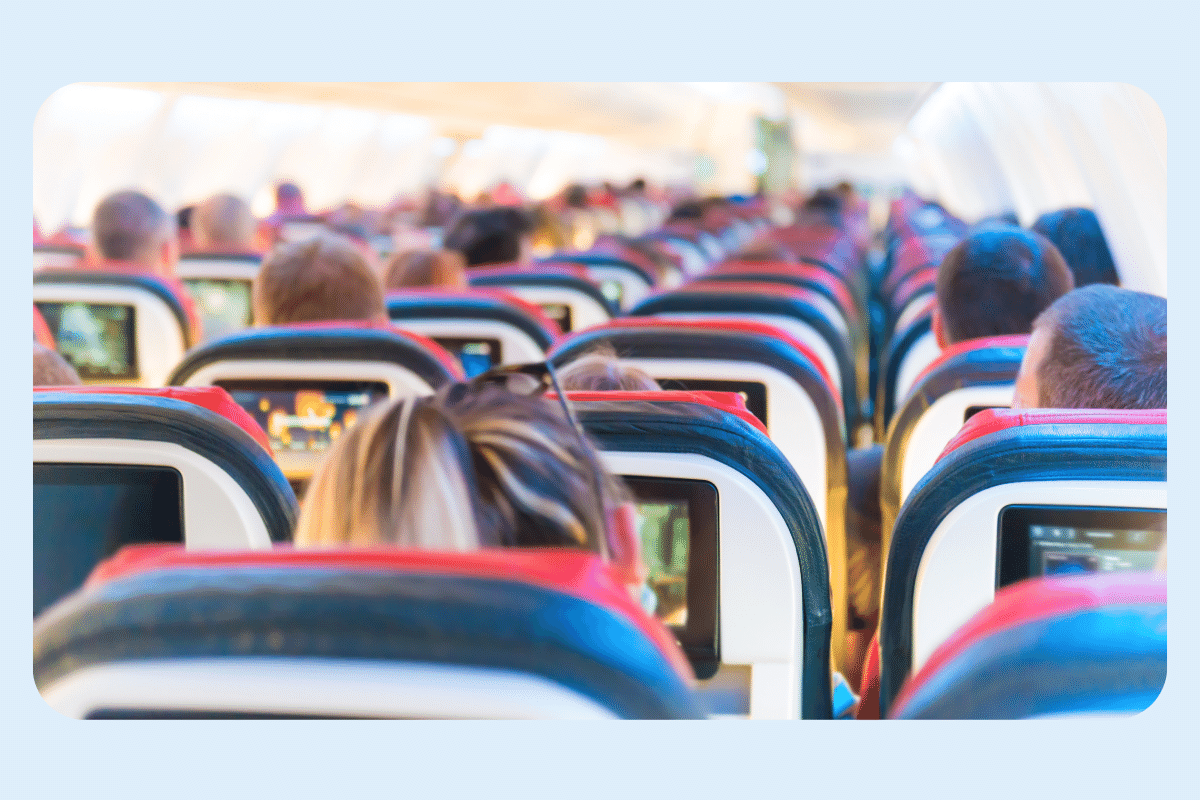
Airlines’ pricing systems have to process an immense amount of customer data as well as travel trends about local destinations.
It is worth mentioning that during the COVID-19 pandemic pricing systems of many popular airlines were pretty severely disrupted. This led to a rather peculiar situation when we could book flights from Europe to the US for less than 200 dollars.
How was that possible? The dynamic pricing engines weren’t prepared for such an exceptional situation.
Nevertheless, as pandemic restrictions loosen, and airlines worldwide resume their normal routes and operations, dynamic pricing systems continue to play a vital role in their business model .
[Read also: Benefits of Digital Transformation for Your Business ]
Airlines are characterized by their large involved capital and incredibly slim average profit margins hovering around 5% (ignoring COVID-19 disruptions).
What does it mean for travel technology trends?
It’s simple. For an airline to make money, it has to adapt fast and consistently search for profitable routing opportunities.
This task has to be handled by automatic scheduling systems .
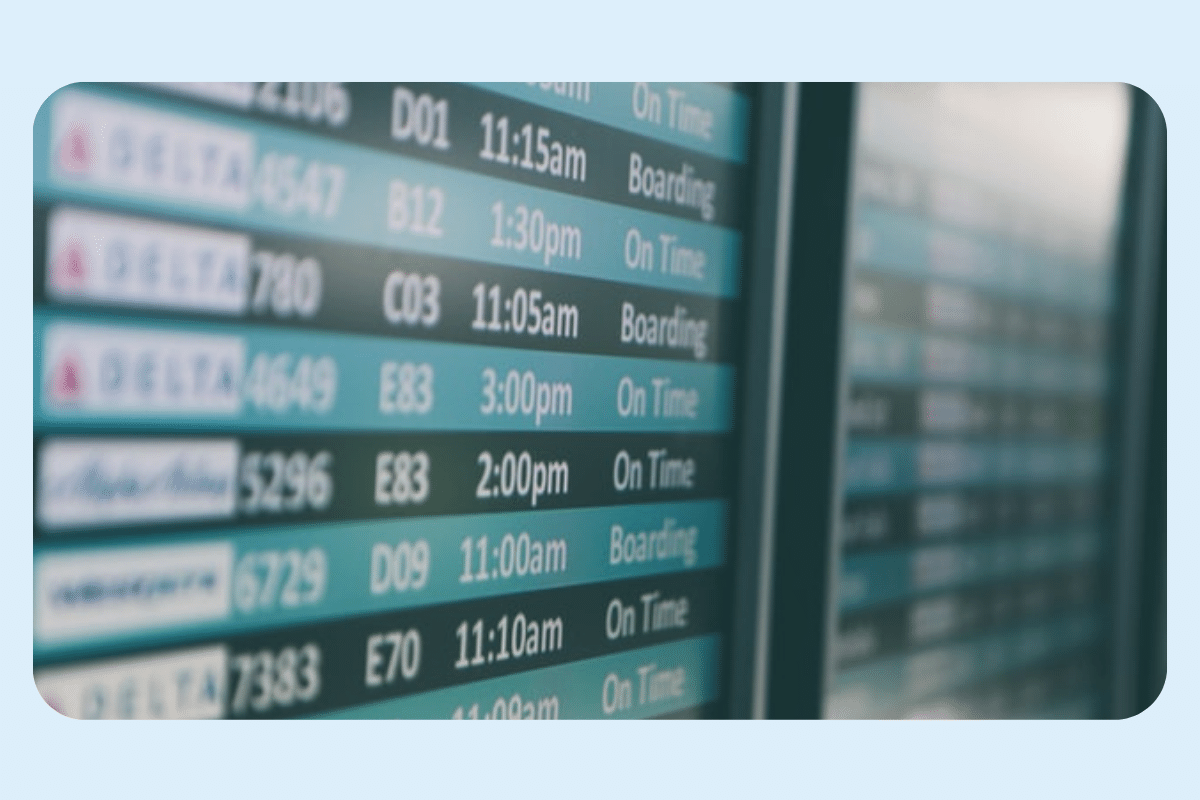
Aside from the cost, the major factor for customers determining which flight they will choose is the overall travel time.
Airlines, therefore, put an enormous effort into assembling the most optimal schedule that they can offer in the shortest travel time possible.
Modern dynamic scheduling systems have to take into account these three factors pointed by Nawal Taneja :
- Scheduling optimization system – An automated solution created by a team of experienced developers that process operational data and identify the set of possible routing and scheduling changes. These have to be both profitable and operationally feasible.Such a system works based on all the possible arrangements of feasible schedule changes. Then it sorts them by their profitability.
- Access to reliable market data – A dynamic scheduling system uses only reliable and accurate data on the routes popularity and its profitability.Considering a fairly short time horizon of flight scheduling operation, the best source for booking and revenue data is an internal Revenue Management system .
- Knowledge about potential operational constraints – Many factors dictate whether a certain route is feasible operationally or not.These include maintenance costs at airports, gate availability, and miscellaneous aircraft-specific constraints.Only understanding all of them can ensure that a dynamic scheduling system can return positive results.
In terms of profitability, it is estimated that dynamic scheduling can result in a 1-3% increase in revenue , depending on its utilization rate.
It constitutes a substantial amount when it comes to the airline industry.
Stratoflow developers have a great deal of experience in this particular field.
They were tasked by a global flight information company to improve their existing system.
Stratoflow proposed a replacement of major calculation logic with an open-source, high-performance framework that dramatically lowered TCO when compared with the existing code.
4. Internet of Things (IoT)
Another emerging technology that is slowly being adopted by the tourism industry is the Internet of Things (IoT)
This concept refers to the network of physical devices —“things”—that are equipped with various sensors in order to connect and exchange data with other systems within the network over the internet.
Depending on the use case, these “things” can range from ordinary household devices to sophisticated industrial machinery.
When it comes to its role in the tourism industry, we’ve already seen some practical implementations beginning to appear.
Some airports, using IoT devices, tag passengers’ bags to alert them of their luggage’s current whereabouts and send them a notification when it arrives at the carousel.
Hotels are also starting to leverage some IoT-enabled sensors and voice control devices to adjust things like air conditioning. Using an in-room tablet, hotel guests can seamlessly control the temperature, music, lighting, and curtains, changing the atmosphere of the room and personalizing their experience to a whole new level.
5. Augmented Reality (AR) and Virtual Reality (VR)
Virtual reality (VR) has recently once again come into the spotlight when Facebook rebranded itself and announced Metaverse. It’s a conceptual virtual universe that will be a future replacement for well-established social networks.
These visions seem exciting and a little eerie at times. But can virtual and augmented reality also influence the tourism industry in the future? As it turns out, the answer is “yes”.
Virtual Reality allows people to explore new places without leaving the comfort of their homes.
Virtual tours will enable people to have a glimpse of a certain exotic place before their visit in person. What’s more, popular travel platforms like Booking.com can set up virtual hotel room previews in order to better manage customer expectations.

Contactless payment methods take pride of place among recent tourism technology trends.
As the pandemic forced people to shy away from physical coins and banknotes, contactless payment options like GooglePay and Apple Pay have gained a lot of popularity.
When using them, the user’s device with a payment app communicates with the reader using RFID technology.
To see how it works in practice let’s take a look at the contactless payment method designed by The Walt Disney Company.
Disney offers Disney World guests custom wristbands, known as MagicBands. Visitors can link their credit card to their MagicBand to make purchases with a simple and effortless swipe of a wrist.
From a business standpoint, this solution offers Disney an unmatched opportunity to track customer behavior in order to optimize its operations even further. It is a trend that is undoubtedly gaining traction in various sectors of the travel industry.

7. AI Integration and AI chatbots
AI is expected to be increasingly used in the hotel and travel industry, creating more seamless travel experiences and supporting new innovations to meet higher guest expectations.
Recently a story has surfaced that, allegedly, an advanced AI chatbot developed by Google has become self-aware.
AI chatbot technology has gone a long way in the last couple of years. It can also play a significant role in the development of the travel and tourism industry.
AI Chatbots stimulates human conversation, mostly using text interactions on various websites and services. Their main objective is to alleviate some congestion in call centers by proving at least basic help for customers 24/7.
When it comes to their usage in the travel and tourism industry, AirAsia is a good example of the use of a successful chatbot. Their advanced chatbot, AVA is able to do a multitude of things from helping travelers to choose seats and book flights to answering more difficult questions about current COVID-19 restrictions.
Data is a company’s most valuable asset.
This is also one of the main reasons why companies in the travel and hospitality industry are investing more and more funds into Big Data solutions.
Put simply, Big Data is a term that refers to large and unstructured data sets obtained from various data sources. These data sets are so voluminous that traditional data processing would have a hard time processing them into useful information.
Modern hotels and travel agents are using big data solutions to more effectively track customer behavior and preferences. This information is later used to improve the guest experience.
Big data measure precisely business performance.
Thanks to receiving data from previously untapped sources, the system allow for better yield management and demand prognosis.
[Read also: Fintech Trends That Shape Financial Future ]
As travel tech trends grow more robust with every passing year, connectivity develops at the same rapid pace.
A couple of years ago, 5G made its debut in some of the largest cities around the world, offering up to 20 times faster download speeds than before.
Even though that might not be such a big deal for an ordinary person, the connection between smart devices can now be more efficient than ever allowing more advanced IoT networks.

We have also seen an emergence of other breakthrough communication technologies, such as the Starlink internet.
Thanks to thousands of satellites in low earth orbit, people in virtually every corner of the world can enjoy internet speeds in excess of 100mbit/s and low latency unmatched by any other satellite internet provider.
A poor WiFi or Internet service in a hotel room can lead to bad online reviews for the hospitality and travel industry. With Starlink, even hotels in the most remote places can have a stable and fast internet connection.
[Read also: What is a GDS? ]
Facial recognition is the software that classifies a single face according to its gender, age, emotion, or other characteristics in an attempt to confirm a person’s identity.
It is currently one of the most powerful surveillance tools ever made.
While many people are happy to use it to effortlessly unlock their phones, companies and governments are beginning to use it to a much greater extent.
Facial recognition devices are beginning to appear in various airports across the world as an advanced security measure and potential deterrence.
According to a recent report from the Department of Homeland Security, “U.S. Customs and Border Protection (CBP) plans to dramatically expand its Biometric Exit program to cover 97 percent of outbound air passengers within four years.”
To verify accounts on virtually every major travel and tourism offer aggregator, you would have to provide a photo of your ID card and other sensitive personal data.
It’s natural to feel a bit uneasy to share so much personal information, regardless of the service’s squeaky clean reputation and impressive market share.
Tourism companies and travel businesses understand that. That’s why they dedicate a substantial amount of resources to developing reliable and safe cybersecurity practices.

As virtual reality and augmented reality technologies are becoming more and more advanced, some people speculate that they will negatively influence the tourism industry, but we beg to differ.
We predict that future tech advancements will push the travel industry towards better travel experiences and even more personalized experience.
Travel technology trends – summary
The travel and tourism industry is the one where proper interactions with the consumer are essential. As new technological breakthroughs enter the market, they are letting corporations understand their customers a bit better, and provide them with improved services and experiences.
Related Posts
- How To Build Travel Meta Search Engine: A Step-By-Step Guide
- Best Travel Management Solutions You Must Know
- Yield Management: What It Is and The Best Strategies
- Hotel Inventory Management 101: An Introduction
- How to Choose the Best Travel Agency Software to Maximize Your Revenue
We are Stratoflow, a custom travel software development company . We firmly believe that software craftsmanship, collaboration and effective communication is key in delivering complex software projects. This allows us to build advanced high-performance Java applications capable of processing vast amounts of data in a short time. We also provide our clients with an option to outsource and hire Java developers to extend their teams with experienced professionals. As a result, our Java software development services contribute to our clients’ business growth. We specialize in building bespoke travel solutions like fast search engines, metasearch engines, booking engine services or channel manager integrations.
Testimonials
The developed software product was built from scratch with solid quality. We have had a long-term engagement with Stratoflow for nearly 10 years. We look at them as partners, rather than contractors. I'm impressed by their team culture and cross-team support.
Nathan Pesin
CTO, Legerity Financials
Stratoflow was a great partner, challenging as well as supporting our customer projects for the best outcome. They have a great pool of talent within the business - all very capability technologists, as well as being business-savvy and suitable for consultancy engagements.
Chris Goodall
Managing Consultant, CG Consultancy (UK) Limited
The bespoke metal exchange platform works great, it is easily accessible and richly functional. Stratoflow managed deadlines capably, meticulously documented their progress, and delivered a complex project at an affordable cost.
Bartlomiej Knichnicki
Vice Chairman, Supervisory Board
We are very pleased with our partnership with Stratoflow and, as we continue to grow, we expect to increase the numbers of developers that work with us on our projects. They have proven to be very skilled and flexible. They're extremely reliable, and they have a very good company culture of their own, which gives them a real edge compared to other providers that serve more as production shops rather than thought partners and creative problem solvers.
Andrew Kennedy
Founder & Managing Director, Tier 2 Consulting
Stratoflow successfully customized the system according to the specific functionalities and without bugs reported. The team was commended for their adaptability in the work process and for their responsiveness.
Joshua Blavins
Tech PM, Digital Agency
The features implemented have received overwhelmingly positive feedback from end-users. Stratoflow has an incredible technical expertise and a high degree of flexibility when it comes to changing project requirements.
Chief Technology Officer, Legerity
They have impressively good knowledge of AI issues. Very responsive to any amendments and findings. Very good communication. We received a finished project which could be implemented into production shortly after testing.
CO-Founder & CTO
Circular Fashion Company
They provided superb service with seamless communication and a highly professional, technical approach. The team displays impressive technical expertise and are willing to share information and engage in constructive feedback.
Filip Stachnik
Operations Manager, Otwarte Klatki (part of Anima International)
They're very skilled technically and are also able to see the bigger picture. Stratoflow can actually think about solutions, not just the technical task at hand, which they've been assigned.
Arnd Jan Prause
Chief Operating Officer, musQueteer
Stratoflow delivered the website successfully within the timeframe and budget. They assured that the output met the set requirements. Overall, the team's performance was excellent and recommended for their exceptional technical business expertise. They've been able to deliver all of their work on time and within budget, which has been very impressive.
Lars Andersen
Founder & CEO, My Nametags
Travel sector rebound after the pandemic is complete. We have fantastic global coverage of travel data distribution due to mutual agreements and data exchange between aggregators. Competition for the best price of limited resources degradates margins. How to win? Provide personalized experience and build your own products in the front-office. The missing bits: a traveller golden record collecting past activities and a AI/ML recommendation technology.
Michał Głomba
CEO at Stratoflow
8 Travel Tech Trends to look at in 2023

According to the World Economic Forum’s Digital Transformation Initiative (DTI), from 2016 to 2025, digitalisation in aviation, travel and tourism is expected to create up to US$305 billion of value for the industry through increased profitability. Also, the global market for Travel Technologies estimated at US$8.6 Billion in the year 2020, is projected to reach a revised size of US$12.5 Billion by 2026.
These data show how technology and digitalization are a must for tourism and travel companies. But which ones are the main technology trends to watch for in the next years?
Voice search
In the past few years, a growing number of travel customers are using voice search to find and book plane tickets, hotel rooms or travel experiences. Voice search allows users to find what they are looking for more quickly and easily in terms of accessibility.
But also, voice search is used to improve travel experiences . For instance, in hotel rooms, voice control devices allow guests to control lighting and heating, order a meal, check the weather forecast or obtain tourism information without needing to speak to a staff hotel member.
Robots that welcome the guests in a hotel, in airports security controls to detect prohibited items, or as waiters in restaurants. There are many uses for robots in the travel and hospitality industry, helping to reduce repetitive tasks and improving safety. The uses of robots have increased in response to Covid-19, especially as they can reduce human-to-human contact in some situations.
Virtual Reality (VR) and Augmented Reality (AR)
We all agree that tourism is experience, in person, physically. However, virtual reality technology can be used, for instance, to do a virtual tour of a hotel to help potential customers to decide. Also, augmented reality enhances the travelling experience by providing details about local destinations on the tourist mobile, providing valuable information about a certain destination.
Moreover, the metaverse : it will never completely replace real travel, but it can be used to educate and promote a destination, hotel, cruise line or other travel experiences.
Artificial Intelligence and Chatbots
According to IBM, chatbots can save companies up to 30% in their customer support costs. Thanks to AI chatbots , travel companies can improve the booking experience, provide support 24/7 during the whole journey, provide an extra level of personalization, offer multi-lingual functionality… Basically, chatbots become the personal assistant for travellers.
Data is key to understanding customer needs and offering an even more personalized experience. Tourism companies can use Big Data to gain valuable information about customers, predict their possible behaviour and provide them with relevant offers. As well, Big Data contributes to better revenue management since it allows to build forecasts based on past demand, past customer behaviour, and various external factors. When demand is predictable, pricing and promotional strategies can also be optimised.
Biometric recognition
One emerging technology that is growing in airports is facial recognition technology . Using biometrics , this technology can recognize the unique shape of your face, your eyes or fingerprints, providing a high level of security in terms of authentication. Another example is how some hotels use this technology to allow access to rooms via fingerprints or to allow for semi-contactless check-outs.
Contactless
The COVID-19 pandemic caused the all-around implementation of contactless solutions to keep employees and guests safe and minimize human contact. Since then, many restaurants don’t have their menu on paper and clients have to scan a QR code to see the menu on their mobile.
In addition, contactless solutions have been used a lot in payments . Contactless payments allow travel companies to process payments much more quickly, especially since the pandemic, as many people stop carrying cash. Contactless payments work by holding a credit card or other device such as a smartphone or smartwatch or, near a card reader. The user’s device communicates with the reader using RFID technology, instead of swiping a magnetic strip or inserting a credit card into a machine.
Cybersecurity
According to a WTTC report, 72% of SMEs business in the UK, US and Europe have reported at least one cyberattack in the past; and 80% of the travel industry are SMEs, proving that cybersecurity is a very real concern for the industry. Some of the biggest threats in this area include phishing attacks and ransomware attacks. This situation requires investment in cybersecurity and solutions to keep the business and data safe.
- © TIS - Tourism Innovation Summit
- Legal Advice
- Privacy Policy
- Cookies Policy
We use technologies such as cookies to store and/or access device information. We do this to improve the browsing experience and to display (non-)personalized ads. Consent to these technologies will allow us to process data such as browsing behavior or unique IDs on this site. Failure to consent, or withdrawal of consent, may adversely affect certain features and functions.

Innovations in Travel: Technology's Influence on Modern Journeys
Posted: November 8, 2023 | Last updated: April 7, 2024
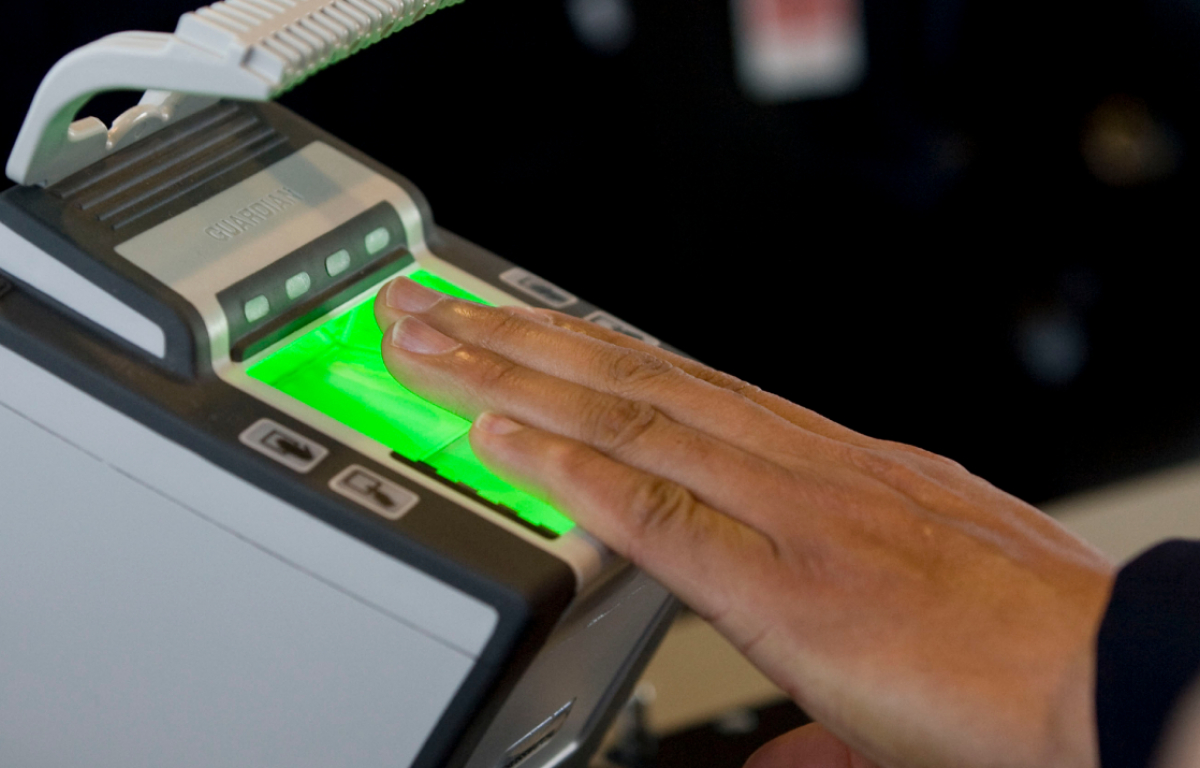
Safety is the number one priority for many people when it comes to traveling. Biometrics have helped make significant progress on that criteria. Biometric technologies like fingerprint scanning, facial recognition, and iris scanning offer a higher level of security compared to traditional identification methods.
Airport security and immigration processes have sped up thanks to biometrics, reducing wait times and eliminating the need for physical documents and manual verification. Biometrics also enable personalized travel experiences by linking individuals’ biometric data with their travel preferences and profiles.

Mobile Payment Solutions
Mobile payment solutions have been playing a major role in the evolution of travel. In fact, the globalization of these payment solutions has enhanced travelers’ experiences wherever they go, reducing the need for physical cash.
Many mobile payment solutions are widely accepted globally, allowing travelers to make payments in different countries without dealing with currency exchange or international banking issues. It also provides financial inclusion by providing access to digital payment methods to people who may not have access to traditional banking services while on the move.

Smart Travel Accessories
Smart travel accessories have solved many inconveniences and issues for travelers. For instance, portable Wi-Fi hotspots or smart travel routers enable travelers to stay connected to the internet while on the go, which is crucial when exploring unknown areas.
Some travel gadgets, like portable chargers, noise-canceling headphones, and smart suitcases with built-in GPS, enhance convenience and optimize travel. These kinds of smart accessories are also used for safety purposes.

Artificial Intelligence (AI)
The AI takeover is real. Platforms like ChatGPT and Bard are regularly used by Internet consumers. When it comes to traveling, artificial intelligence can be very useful, and these chatbots can be used to provide information and assist with bookings.
AI algorithms can analyze large amounts of data, including user preferences and past travel behavior. Using that data, AI can offer personalized travel recommendations. For businesses in the tourism industry, AI algorithms can analyze market trends and demand patterns to generate selling strategies and offer the best prices to maximize revenue.

Virtual Reality
Technology has advanced so much that it allows us to travel to a certain place before actually going there. How? Virtual reality allows travelers to go through immersive experiences. Through VR headsets or immersive displays, users can virtually “step into” different locations, allowing them to explore and interact with their surroundings as if they were actually there.
These kinds of experiences can help people take a look at places that they haven’t been able to visit. It also provides helpful information that can help travelers make decisions ahead of their trip.

Augmented Reality
Augmented reality apps help travelers by providing real-time information about particular places, attractions, and destinations. AR can help people navigate unfamiliar cities and learn about those places along the way.
Interactive guides, real-time translation, and personalized recommendations are some of the features that AR apps provide to travelers. They improve users’ engagement with the destination where they’re at and provide much-needed information when discovering new places and navigating unknown territories.
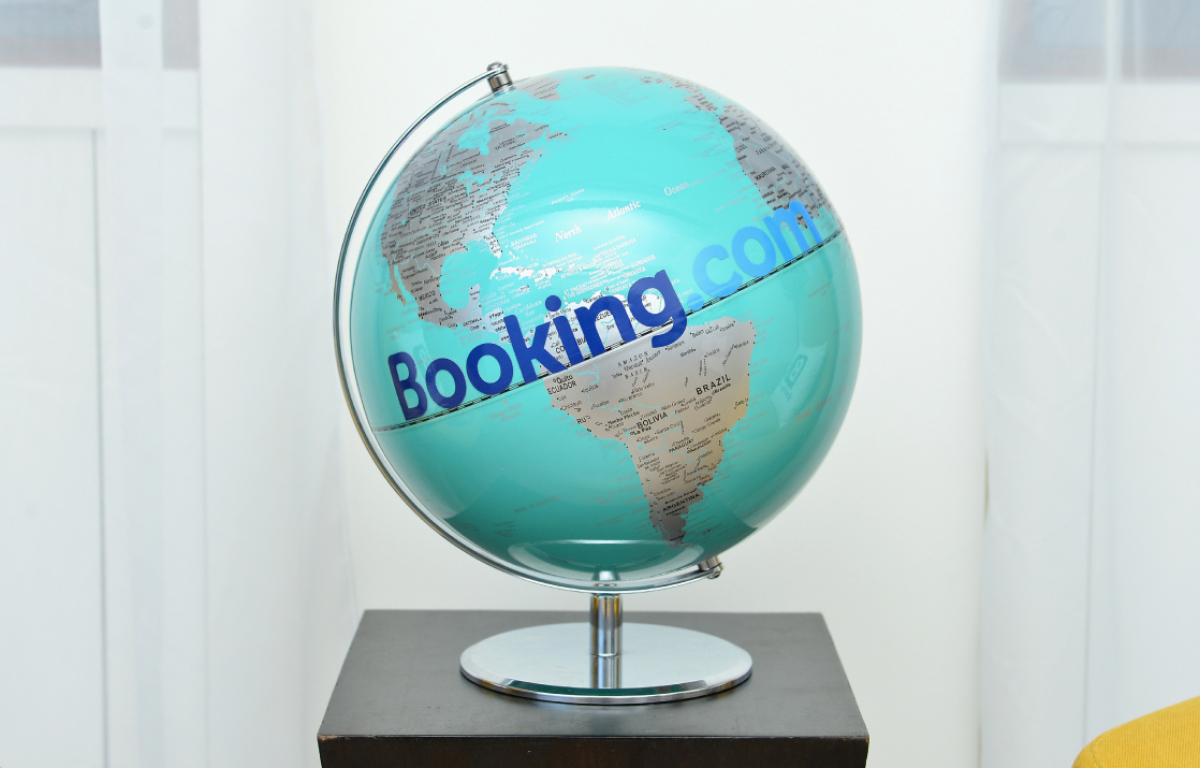
Online Travel Agencies (OTAs)
Online Travel Agencies have resolved many obstacles regarding travel accommodations. Platforms like Expedia, Booking.com, and Airbnb have made it easier to find and book accommodations wherever you go.
Providing a wide range of options and competitive prices, OTAs eliminate the need to visit multiple websites or make many phone calls to organize trips. User reviews and ratings, with 24/7 availability and customer support, have helped travelers get references about possible destinations and accommodations.

Internet of Things
The Internet of Things (IoT) describes the network of everyday objects connected to the internet via embedded devices with sensors, software, and other technologies. IoT devices have also impacted the travel experience.
Whether it’s smart luggage trackers or hotel room controls, these kinds of devices improve the traveler’s experience and organization. It also helps to ensure safety when traveling with devices such as smart surveillance systems equipped with IoT sensors.
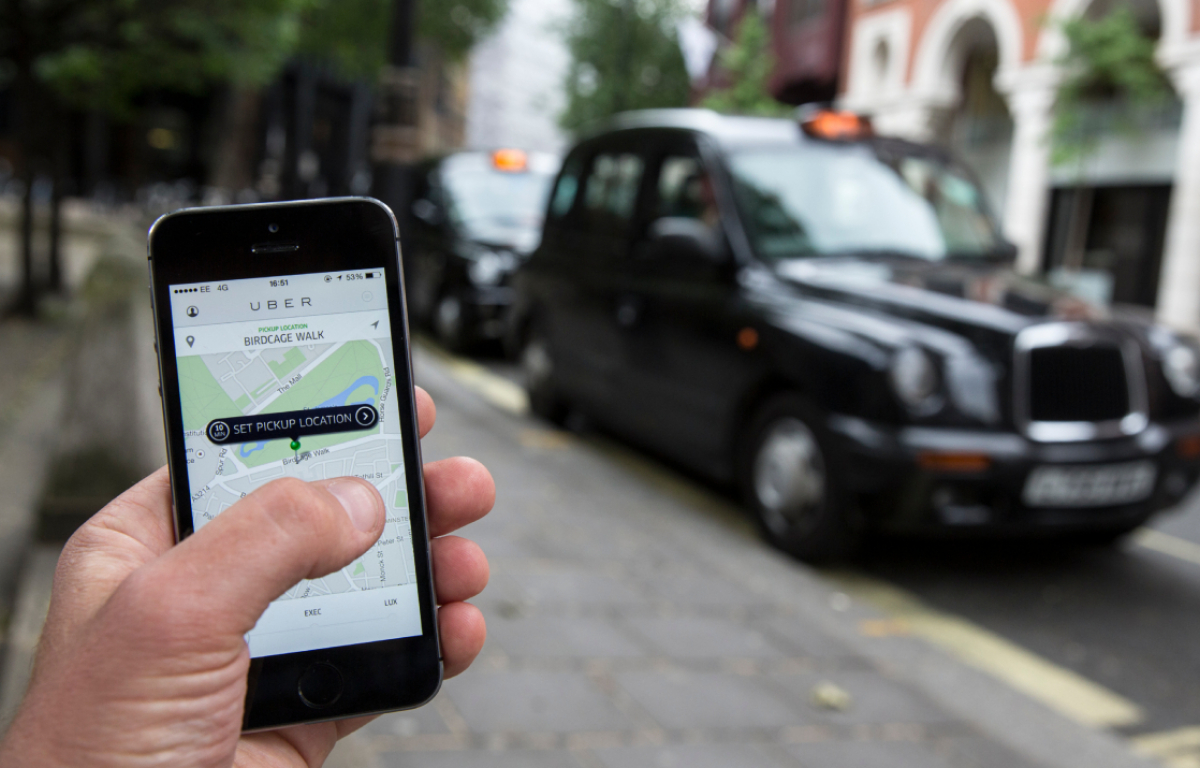
Ride-Sharing Services
The long-awaited alternatives to traditional car rentals and taxis have finally arrived in the last couple of years. Companies like Uber and Lyft have revolutionized transportation with their convenient ways of getting a car to move around a city.
Smartphone apps help travelers request a ride, track their driver’s location, and pay for the service without the need for cash. Pricing models, such as dynamic pricing based on supply and demand, can offer competitive rates, especially during non-peak hours when regular taxis are not available or hard to find in some cities. These companies usually offer safety and transparency by providing driver background checks, vehicle inspections, and real-time tracking of rides.

When it comes to cybersecurity and transparency, blockchain technology has had a major impact on travel. Passenger identities and booking records are stored on the decentralized blockchain, reducing the risk of fraud, identity theft, and data breaches.
Blockchain technology also helps with payments. In the travel industry, the blockchain eliminates any intermediaries in the payment, like banks, enabling peer-to-peer (P2P) transactions, saving time and transaction costs, and enhancing transparency. It also plays a big part in loyalty programs, with the use of blockchain-based tokens or cryptocurrencies that allow more flexibility in the program’s rewards and can be redeemed through multiple participating travel providers.

Electric and Hybrid Vehicles
In a world where there’s air pollution nearly everywhere, the transportation industry is trying to change that with electric and hybrid vehicles. The quest for environmental sustainability has allowed these vehicles to change the way we travel.
Electric and hybrid vehicles produce lower or zero carbon emissions, helping to fight air pollution, greenhouse gas emissions, and climate change. In that way, sustainable and eco-friendly travel can be achievable in countries that have and produce these kinds of vehicles.

In a data-driven modern world, Big Data allows businesses to gather and process large amounts of data from travelers. This allows them to offer personalized travel experiences tailored to individual preferences, customized promotions, and personalized recommendations.
Big data enables businesses to gain a deeper understanding of customer needs and preferences. Business-wise, it analyzes market trends and demand patterns to optimize selling strategies and pricing. It also helps travelers improve their planning and trip management.

Travel Sharing Platforms with User Reviews
One of the most important aspects of traveling is trusting the people who are in charge of the transportation, accommodations, tours, and other trip activities. Travel sharing platforms have gained a lot of popularity over the course of the years thanks to the facilities they provide for both parties to connect and interact.
Another key part of travel sharing platforms are the user-generated reviews and recommendations. Platforms like TripAdvisor and Yelp help travelers make informed decisions based on other travelers’ opinions.

Autonomous Vehicles
While still in the early stages, autonomous vehicles promise to change the way we travel forever. Brands like Tesla and cities like San Francisco have begun experimenting with driverless vehicles. The main advantage of autonomous vehicles is that they can eliminate human error, which is the leading cause of accidents due to distractions, fatigue, or impaired driving.
They detect advanced sensors and cameras and use artificial intelligence algorithms to navigate and make decisions on the road. Autonomous vehicles also have the potential to increase accessibility and mobility for people who cannot drive.

Mobile Apps
The days of using gigantic maps to move around unknown territory on your trips are over. Travel apps have changed the way we organize and manage every journey. It seems like every problem or issue can be easily resolved by just unlocking a smartphone and downloading different apps.
Airlines have their own apps to book flights. Some hotels and activities can also be booked through apps, while car rentals and tickets for other modes of transport can also be secured online. Moreover, any Maps application on smartphones can provide real-time information and even travel guides while spending time far from home.
More for You
Russia 'shoots down US drone' over Black Sea as World War III fears intensify
EV owner highlights frustrating trend happening at charging stations across the country: 'They need to make this a federal offense'
Legendary 70s rock band announce they will retire after current tour
How a peak boomer who moved from Texas to a tiny home in New York lives 'perfectly comfortably' on less than $30,000 a year
Perkins, the aging diner chain, has a ‘new vibe’ with a different name
Russell Wilson's Offseason Transformation Triggers Online Buzz
‘Kelly Clarkson Show’ Fans Have a Major Demand After Seeing Her Latest Kellyoke Cover
Experts make worrisome discovery on Mt. Everest climbing paths: 'The probability of that getting worse … increases'
The 5 most common deathbed regrets, according to a palliative care nurse
The Supersized Weed That Is Very Dangerous In Your Yard
This legendary Applebee’s franchisee says Americans are 'abandoning fast food' — and explains that he was 'running for his life' due to payroll, food costs
This U.S. State Is One of the Best Places to Retire for Low Crime, Taxes, and an Affordable Cost of Living
The FDA has issued a nationwide recall of over 60 ice cream brands
Here’s What Those Little Black Dots on a Windshield Are For
This Is the Average Social Security Benefit for a 70-Year-Old
Reacher Season 3: Release, Plot, Cast & News
Filipino soldiers who faced off against Chinese coast guards armed with axes and knives given medals
California May Start Charging Drivers by the Mile
This maths brain teaser will put your skills to the test
This Rare Phenomenon That Happens During Sleep Could Unlock Secrets of Dreaming
Where Innovation Meets Economics: The Principles and Perspectives Behind Informed Investing in Hospitality Technology

As the world’s largest, longest-running hospitality technology exposition and conference, HITEC North America has always been an attractive destination for hospitality investors and technology companies alike. Each year, the conference brings together hundreds of the latest hospitality technology products and services onto one massive show floor, proving to be an indispensable opportunity for many of those looking to underwrite innovation in the industry.
In 2024, the producers of HITEC recognized a need to create even more value for this contingent of attendees: by launching a brand-new, co-located event called HITEC Technology Investment Conference (HITEC-IC). Taking place at the tail end of #HITEC Week, June 27-28, the inaugural HITEC-IC features a comprehensively investment-focused education program, curated tours of the HITEC Exhibit Hall, and networking opportunities to specifically connect the investment community with representatives from the companies behind the technology.
It is important to not only know which technologies are driving innovation in the hospitality industry, but also how to evaluate the risk and value of these technologies in economic terms. Therefore, the education program has been carefully developed to present a range of valuable perspectives and expertise including the hotel technologist, financial advisors, the entrepreneur now listed on NASDAQ, and the advocate group AAHOA who champions the hotel industry nationally.
Planning the conference’s educational component is event chair Prakash Shukla, who serves as an advisor on the HFTP Global Executive Committee. Shukla’s professional experience overlaps extensively between the investment sector and hospitality technology. He currently is managing partner at Wayfare Ventures, an angel capital investment firm supporting the commercialization of innovations in travel, technology and related services. His background involves investment, general management, finance, technology and entrepreneurship, with previous roles as partner at private equity firm HandsOn Global Management (HGM), SVP/CIO of TAJ Group of Hotels, and an early investor in the companies Speech & Software Technologies, TravelGuru and Transerv. Shukla was inducted into the HFTP International Hospitality Technology Hall of Fame in 2016.
Kicking off the HITEC-IC 2024 education program is Floor Bleeker, Group CTP for Accor. In his session “Tipping Point in Hospitality: Growing Investments and Maturing Technologies,” Bleeker will provide a forward-looking perspective on the technological advancements shaping the hospitality industry including sustainability and AI. Attendees will come to understand the strategic advantages of investing in advanced hospitality tech including enhanced operational efficiency, cost savings and improved guest satisfaction to drive sustainable growth and future readiness.
A highlight of the program is a candid, insightful case study of Agilysys. Led by its CEO/President Ramesh Srinivasan, “The Agilysys (Nasdaq: AGYS) Turnaround Story – 2017 to 2024” will explore the enterprise software company’s transformation from low-level stagnation to a nearly tenfold growth in market capitalization in just under seven years (with a two-year global pandemic in between). The company will share what was done well and what could have been done better, the lessons learned, and the approach that should be used to drive revenue growth, improve profitability and achieve results.
A panel of AAHOA’s leadership including President/CEO Laura Lee Blake, Vice Chairman Kamalesh Patel and Chairman Miraj Patel will also explore the industry’s latest technological advancements in guest experience, operational efficiency and sustainable practices, plus provide practical, actionable solutions tailored for hotel owners. In their session “Revolutionizing Hospitality: Cutting-edge Tech Innovations for Hotel Owners at the Grassroots Level,” attendees will gain insights into how grassroots-level innovations can drive growth, enhance customer satisfaction and give your hotel a competitive edge. Attendees will also benefit from hearing about the impact these technologies have in real-world applications from hotel owners who oversee operations at the ground-level.
Another panel will explore technology investments from the asset owner’s perspective, to understand what drives their decisions, and how they create value from their investments now and in the future. Join panelists (Michael Blank, Principal at Woodmont Lodging, Jeffrey Friedlander, SVP at Clarion Partners, and Melissa Silvers, Principal at SCS Advisors) and moderator David Chestler (President at ProVision Partners) to explore how technology affects investments in the hospitality industry while balancing operations, guest engagement and budgets. What are asset managers really looking for when managing their projects and portfolios? How can brands differentiate themselves? And how can vendors appeal to asset owners and operators?
The education program will further connect tech innovation with underlying economic principles that drive investment decisions. First, explore the global state of the economy with Jim Meek, Managing Director Wealth Management-Institutional Consulting Director at Graystone Consulting, a business of Morgan Stanley. And in another session entitled “Economics, Risks and Asset Pricing,” attendees will be shared valuable insights into the macroeconomic variables, potential risks and current trends driving growth and contraction in the hospitality industry. The leader for this session, Samir Shah, CIO at MBS Mantra, LLC will connect economics, money supply, interest rates and leverage to pricing and performance in commercial real estate and hospitality asset investments, while also evaluating the risks they create.
Capping off the first full day of the program will be a two-hour series of roundtable discussions hosted by notable industry heavyweights including: Sherry Marek, CEO at Aiken Street; Shannon McCallum, VP of Hotel Operations at Resorts World Las Vegas; Ian Millar, Senior Lecturer at EHL Hospitality Business School; Rich Siegel, President/Publisher at Hospitality Upgrade/Hotel Online; Ira Vouk, Founder at Hospitality 2.0 Consulting; and Lyle Worthington, CEO at Worthington Tech.
The second and final day of HITEC-IC will feature a noteworthy discussion led by Rich Siegel and HFTP CEO Frank Wolfe on the topic of mergers and acquisitions (M&A) in hospitality, focusing on the exploration of real-world case study methodology with the audience.
Learn more about the education program expected at the inaugural HITEC-IC, as well as the various networking opportunities, by visiting the full schedule online . Registration for HITEC-IC is now open. Please note that separate registration for this event is required from HITEC. Complete event details are available at www.hitec.org/special-events/hitec-ic .
This site uses cookies to store information on your computer. Some are essential to make our site work; others help us give you the best possible user experience. By using the site, you consent to the placement of these cookies. Read our Privacy Notice to learn more.
It’s been a record-setting year for global travel – here’s how we make tourism inclusive and sustainable

Inclusive and sustainable travel and tourism includes supporting micro-, small- and medium-sized businesses. Image: Unsplash/Michael Barón
.chakra .wef-1c7l3mo{-webkit-transition:all 0.15s ease-out;transition:all 0.15s ease-out;cursor:pointer;-webkit-text-decoration:none;text-decoration:none;outline:none;color:inherit;}.chakra .wef-1c7l3mo:hover,.chakra .wef-1c7l3mo[data-hover]{-webkit-text-decoration:underline;text-decoration:underline;}.chakra .wef-1c7l3mo:focus,.chakra .wef-1c7l3mo[data-focus]{box-shadow:0 0 0 3px rgba(168,203,251,0.5);} Nicola Villa

.chakra .wef-1nk5u5d{margin-top:16px;margin-bottom:16px;line-height:1.388;color:#2846F8;font-size:1.25rem;}@media screen and (min-width:56.5rem){.chakra .wef-1nk5u5d{font-size:1.125rem;}} Get involved .chakra .wef-9dduvl{margin-top:16px;margin-bottom:16px;line-height:1.388;font-size:1.25rem;}@media screen and (min-width:56.5rem){.chakra .wef-9dduvl{font-size:1.125rem;}} with our crowdsourced digital platform to deliver impact at scale
- The global travel sector is experiencing a robust recovery, with tourists increasingly spending more on travel.
- Despite the overall positive outlook, some destinations struggle with operational challenges, including workforce issues and resource management amid rising tourist numbers and environmental concerns.
- The travel and tourism sector’s potential for advancing socio-economic prosperity is particularly impactful through the support of micro-, small-, and medium-sized enterprises.
The global travel sector forecast is in and it's sunny skies ahead. Through March 2024, consumer spending on travel remains strong, and passenger traffic has soared. Empowered by a strong labour market worldwide, tourists will be on the roads, air and seas once again, with more of people’s budgets on travel.
The latest report from the Mastercard Economics Institute, Travel Trends 2024: Breaking Boundaries , reveals that 2024 has already witnessed multiple record-setting days as consumer spending on leisure travel remains strong. The data shows that post-pandemic travellers continue to seek unique experiences rooted in local cultures while increasingly prioritizing spending on memorable events across sports, music and festivals.
The Mastercard Economics Institute’s analysis reveals that travellers also seek opportunities to extend their stays, prioritizing leisure for longer. For the first 12 months between March 2019 and February 2020, a trip’s average length of stay was about four days. As of March 2024, the average length of a leisure trip has edged closer to five days, which translates into an economic boost for the destinations and communities hosting them.
Have you read?
These are the top 10 countries for travel and tourism, what is travel and tourism’s role in future global prosperity, travel & tourism development index 2024, tackling tourism’s challenges.
Yet, while the overall outlook for travellers looks bright, that’s not the case for all destinations. Some tourism hotspots and lesser-known locales are facing growing challenges around operating conditions. The World Economic Forum’s Travel & Tourism Development Index (TTDI) 2024 highlights the ongoing constraints facing the global travel and tourism sector – including the lack of investment in skilled and resilient workforces and issues around resource management – cultural and natural – as destinations grapple with higher tourist visitor numbers and rising environmental concerns.
The report offers travel and tourism decision-makers recommendations around how the sector can take a more active role in tackling social challenges across socio-economic prosperity, peace and cultural exchange. As the industry accounts for approximately one-tenth of global gross domestic product and employment , the public and private sectors must work together to ensure future tourism development is, first and foremost, inclusive and sustainable.
Supporting the backbone of travel and tourism
As the TTDI 2024 notes, one area where the sector’s potential in advancing socio-economic prosperity can be particularly impactful is in the economic empowerment of micro-, small- and medium-sized enterprises (MSMEs). According to the World Travel & Tourism Council, more than 80% of travel and tourism businesses fall under this category.
Policies and investments promoting the adoption of digital solutions and enhancing digital skills development while improving access to credit can provide a major boost to tourism-focused MSMEs.
In Costa Rica, the Instituto Costariccense de Turismo, a member of Mastercard’s Tourism Innovation Hub , is championing such an approach to ensure increased tourist traffic results in better opportunities for MSMEs. Last year, the institute launched Tico Treasures , a platform facilitating tourist connections with Costa Rica’s Crafts with Identity programme, a group of 17 artisan collectives across the country. The platform allows visitors to discover local Costa Rican products, learn about artisan communities and then purchase and ship the goods back to their home country – all through one experience.
The programme is an example of public-private collaboration, including backing from Correos de Costa Rica, Banco de Costa Rica and the Instituto Costariccense de Turismo. Its objectives are multifold: delivering more authentic experiences for tourists, expanding citizens’ access to the digital economy and contributing to MSME resilience.
Protecting future environments
There are also novel approaches to solving destinations’ sustainability challenges underway. A key role of the Travel Foundation , a global non-government organization, is to facilitate innovative public-private collaborations in tourism that accelerate and scale sustainable solutions. One notable example is in Scotland, where the national tourism organization VisitScotland is partnering with the Travel Corporation, a global tour operator, to help decarbonize the destination supply chain. Both organizations are pooling their insights, data and expertise to support local businesses, develop new ideas for reducing carbon footprints and identify barriers to a green transition.
The learnings from this and other projects led by the Travel Foundation will be shared to influence future policy, investment and product development decisions at national and global levels. By combining public sector resources and capabilities with private sector technological expertise, travel and tourism decision-makers can enact policies and programmes that balance tourism growth with environmental protection, providing a nuanced approach that works for unique destinations.
It’s an important time for the sector – to leverage travel and tourism’s robust recovery and advance socio-economic prosperity, fuelling a more inclusive future for our treasured destinations. By accelerating collaboration between governments, destination management organizations and technology companies, we can ensure destinations, the communities that power them and the environments they inhabit are at the heart of all future tourism development.
Don't miss any update on this topic
Create a free account and access your personalized content collection with our latest publications and analyses.
License and Republishing
World Economic Forum articles may be republished in accordance with the Creative Commons Attribution-NonCommercial-NoDerivatives 4.0 International Public License, and in accordance with our Terms of Use.
The views expressed in this article are those of the author alone and not the World Economic Forum.
The Agenda .chakra .wef-n7bacu{margin-top:16px;margin-bottom:16px;line-height:1.388;font-weight:400;} Weekly
A weekly update of the most important issues driving the global agenda
.chakra .wef-1dtnjt5{display:-webkit-box;display:-webkit-flex;display:-ms-flexbox;display:flex;-webkit-align-items:center;-webkit-box-align:center;-ms-flex-align:center;align-items:center;-webkit-flex-wrap:wrap;-ms-flex-wrap:wrap;flex-wrap:wrap;} More on Trade and Investment .chakra .wef-17xejub{-webkit-flex:1;-ms-flex:1;flex:1;justify-self:stretch;-webkit-align-self:stretch;-ms-flex-item-align:stretch;align-self:stretch;} .chakra .wef-nr1rr4{display:-webkit-inline-box;display:-webkit-inline-flex;display:-ms-inline-flexbox;display:inline-flex;white-space:normal;vertical-align:middle;text-transform:uppercase;font-size:0.75rem;border-radius:0.25rem;font-weight:700;-webkit-align-items:center;-webkit-box-align:center;-ms-flex-align:center;align-items:center;line-height:1.2;-webkit-letter-spacing:1.25px;-moz-letter-spacing:1.25px;-ms-letter-spacing:1.25px;letter-spacing:1.25px;background:none;padding:0px;color:#B3B3B3;-webkit-box-decoration-break:clone;box-decoration-break:clone;-webkit-box-decoration-break:clone;}@media screen and (min-width:37.5rem){.chakra .wef-nr1rr4{font-size:0.875rem;}}@media screen and (min-width:56.5rem){.chakra .wef-nr1rr4{font-size:1rem;}} See all

Why strong regional value chains will be vital to the next chapter of China and Africa’s economic relationship
Chido Munyati
June 25, 2024

New report details global trade challenges - and other international trade stories to read this month
Khalid Alaamer
June 21, 2024

How an affordable cross-border delivery service will unlock the promise of millions of SMEs in Southeast Asia
Pete Chareonwongsak
June 17, 2024

IDEA: Investing in the Digital Economy of Azerbaijan

Digitalization is disrupting global trade – here's how AI can help customs and businesses to respond
Sebastian Klotz, Steve Barr and Jimena Sotelo
June 6, 2024

TradeTech is revolutionizing global trade
June 5, 2024
Trade snow for sunshine: Delta’s new flights from MSP to Aruba, St. Maarten and more

This winter, Delta is serving up new travel options from Minneapolis-Saint Paul to the tropical paradises of Aruba and St. Maarten. The airline is also enhancing its service from MSP to Grand Cayman and San Juan, Puerto Rico, offering customers more opportunities to escape the cold and enjoy a tropical getaway. "As the leading carrier from MSP to Latin America and the Caribbean, we're looking forward to increasing our seats to these popular destinations, offering unmatched convenience and expanded choices for our customers," said Joe Esposito, Delta’s Senior Vice President – Network Planning. "With the addition of Aruba, St. Maarten and recently added Mazatlán, customers have three brand-new sunny destinations to look forward to this winter."

Delta's new flights to Aruba (AUA) will operate on Fridays and Sundays. Travelers can unwind on Eagle Beach, snorkel in the blue waters of Baby Beach, explore Arikok National Park and enjoy the vibrant nightlife of Oranjestad.
St. Maarten

Delta flights to St. Maarten (SXM) will operate on Thursdays and Saturdays. Travelers can immerse themselves in the island's rich culture, visit the bustling Marigot Market, savor diverse cuisine at Grand Case, engage in water sports at Orient Bay and explore scenic hiking trails.
More sunny getaways for MSP travelers
Delta is also increasing its services to Grand Cayman (GCM) with an additional weekly flight, totaling three, and to San Juan (SJU) with two more weekly trips, totaling 10. And there's more to come this winter with the recently announced flights to Mazatlán, Mexico (MZT), another new destination, further expanding Delta's footprint in Latin America. With these new and expanded routes, Delta will operate 126 weekly flights and offer more than 20,000 seats per week from MSP to 15 stunning destinations this winter, including other popular places like Punta Cana, Dominican Republic, Liberia, Costa Rica; and Montego Bay, Jamaica.
“The continued surge in international travel has been a key trend for MSP in recent years, and we are excited to see Delta add this new service,” said Brian Ryks, CEO of the Metropolitan Airports Commission, which owns and operates MSP Airport. “With the addition of these new flights, Upper Midwest travelers now have their largest-ever range of options to Latin America and the Caribbean. It’s a great time to start planning that winter escape.”
A premium winter travel experience throughout the journey
Delta Sky Club customers can look forward to a comfortable start to a tropical getaway at Delta’s Minneapolis hub. Earlier this year, the airline unveiled its third and largest Delta Sky Club at MSP , featuring seating for more than 450 guests, a first-of-its-kind Sky Deck and more.
Delta’s St. Maarten and Aruba service will operate on the Boeing 757-200 (75D) seasonally this winter providing customers a choice of First Class, Delta Comfort+, and Main Cabin options. Travelers in First Class can enjoy a chef-curated meal experience as well as complimentary premium wine, beer and spirits. Delta Comfort+ passengers can also enjoy complimentary beverages and more room to relax. Passengers in all cabins will enjoy more than 1,000 hours of complimentary premium entertainment via Delta Studio, in-seat power and fast, free Wi-Fi for Delta SkyMiles members. Additionally, SkyMiles Members traveling to their sunny destinations can also enjoy Delta’s new personalized seatback screen. Delta Sync seatback is a milestone update to the airline’s industry-leading seatback screens that make them feel more like smart TVs while offering a host of day-of-travel tools for SkyMiles members designed to streamline their travel journey.
Customers looking to book their vacation to Latin America or the Caribbean can do so through Delta Vacations - with flights as well as expert-recommended hotels, rides and activities booked all in one place. Only with Delta Vacations, SkyMiles Members can earn toward Medallion Status on the flight, hotel, car rental, and activity components of their vacation; earn bonus miles in addition to flight miles; and use miles to pay for all or part of their trip, making their sunny escape even more rewarding.
Detailed flight schedules are as follows:
- Routes , Destinations , Minneapolis–Saint Paul International Airport (MSP) , Caribbean , Latin America

Global Times reporter on society, artificial intelligence and diplomatic relations.

Global Times reporter tracking China's space programs and cutting-edge science and technology projects.

China's highest science and technology awards are announced in Beijing on June 24, 2024, with two scientists, Li Deren and Xue Qikun, winning the national top sci-tech award for the year 2023. Photo: Xinhua

China has shared over 1.5 terabytes of remote sensing satellite data with BRICS countries, and will continue to ...


IMAGES
VIDEO
COMMENTS
Welcome to Global Innovations - Travel Technology Company. Global Innovations is a leading travel technology & Solutions company, based in UAE, providing software solutions to DMCs (Inbound Operators), Travel Wholesalers (Outbound) and Travel Agents which enable them to fully automate their business processes.
Global Innovations is a leading Travel Technology & Solutions company, based in Dubai UAE, providing software solutions to DMCs (Inbound Operators), Travel Wholesalers (Outbound) and Travel Agents which enable them to fully automate their business processes. With the profound knowledge, expertise, skill set and proven record of last 17 years ...
Global Innovations is a leading travel technology & Solutions company, based in UAE, providing software solutions to DMCs (Inbound Operators), Travel Wholesalers (Outbound) and Travel Agents which ...
Based on the Travel Innovation Map, the Tree Map below illustrates the impact of the Top 9 Travel Industry Trends in 2024. Startups and scaleups are enabling contactless travel using technologies like biometrics, radio-frequency identification (RFID), and near-field communication (NFC). This is due to increasing health and hygiene concerns post ...
Today, travel insurance has become a global industry with a variety of options that range from stand-alone policies, add-ons to existing health insurance policies and benefits attached to premium credit cards. Travel insurance is an important innovation as it provides peace of mind and confidence for travelers.
Global Travel Tech is revolutionizing travel. We unite leaders in travel to help decision-makers harness the power of technology to provide traveler-centric solutions based on transparency and sustainability. ... Empowering Global Travel Through Tech Innovation. In the dynamic world of travel and tourism, technology has emerged as a powerful ...
The latest technology trends in the travel and tourism industry for 2024. The hottest tips & travel tech trends, and innovate your business.
Global Innovations - Travel Technology, دبي. 516 likes. Global Innovations is a leading Travel Technology & Solutions company, based in Dubai, providing software solutions to DMCs (Inbound...
"The metaverse is not intended to replace physical travel, rather provide a complementary enhancement to an overarching experience. Giving the option to sit in a virtual first-class seat, experience the lounge or walk around a hotel resort or room, opens up opportunities to truly engage and inspire people before they travel," said Emily Weiss, senior managing director and global head of ...
Each year, Phocuswright publishes a content series that identifies the most significant innovation trends in travel technology and distribution for the upcoming year and beyond. This year we again incorporate the views of our extended analyst team, who contribute a range of perspectives and expertise. This report features brief introductions to the in-depth discussions that will be explored ...
PO Box 760, Sherman, CT 06784 USA | Telephone: +1 201 902-2000. The Phocuswright Conference•Phocuswright Europe•Global Startup Pitch•Travel Tech Fellowship•Phocuswire•Web In Travel•Inntopia•Retail Travel•Hotel Investment. The most significant innovation trends in travel technology and distribution for 2024 and beyond.
UV-C cleaning. Hospitals have used UV-C light to disinfect and kill viruses for more than two decades. Now, indoor public spaces including airports, gyms, and movie theaters are adding UV-C to ...
We Are Travel Tech. The Travel Technology Association (Travel Tech) empowers traveler choice by advocating for public policy that promotes marketplace transparency and competition. Travel Tech represents the leading innovators in travel technology, including global distribution systems, online travel agencies, metasearch companies, travel ...
Each year, Phocuswright's expert analysts identify the technology and innovation trends that will influence travel significantly in the coming year and beyond. This year, we're exploring the growing roles of social media and Web3 in travel, addressing the realities of sustainability and our fragmented technology landscape, and pondering the ...
Tech innovation in the travel sector has always been uneven. While some aspects of the travel experience have been greatly enhanced by technology in recent times, these innovations have had to co ...
10. Omio. Omio is a travel search engine technology platform and software solution that empowers travelers to search for trains, buses, flights, ferries, car rental, and airport transfers. Travelers can book all their tickets in one place on this travel aggregator, making for a seamless transport journey.
Alex Goryachev is an award-winning AI & innovation executive and the WSJ bestselling author of Fearless Innovation. His extensive international experience includes creating and leading Global ...
The share of digital ad spending in the travel and leisure industry will reach 14.5 percent in the United States and 13.9 percent in the United Kingdom in 2024. The world's leading online travel agencies (OTAs) will spend $2.3 billion on Google advertising in 2024. The global travel and tourism market will shift from 66 percent offline sales ...
Every generation has its own "golden age" of travel, often defined by the widespread adoption of new technology—from the jet engine of the 1950s that drastically reduced travel times to the dot-com period of the 1990s that allowed customers to build their dream itineraries online. Today, a new era of digitally enabled travel is upon us. Advances in artificial intelligence (AI), including ...
The intersection of AI and travel has sparked a new era of innovation, significantly altering how we explore, book, and experience our journeys. A focal point of this transformative wave is the ...
Travel Technology and Innovation Trends 2023. Location. online. Date. July 13, 2023. register now. As the world fully reopens in the wake of the COVID-19 pandemic, the travel industry can once again focus its attention squarely on the future. While significant challenges remain (i.e., inflation, recession, staffing, international conflict), it ...
Also, the global market for Travel Technologies estimated at US$8.6 Billion in the year 2020, is projected to reach a revised size of US$12.5 Billion by 2026. These data show how technology and digitalization are a must for tourism and travel companies. But which ones are the main technology trends to watch for in the next years? Voice search
In 2024, we'll see different kinds of innovation in travel experiences to suit women -- not just in technology, but also more family-friendly travel planning, communal trip planning, and amenities ...
Blockchain. When it comes to cybersecurity and transparency, blockchain technology has had a major impact on travel. Passenger identities and booking records are stored on the decentralized ...
The education program will further connect tech innovation with underlying economic principles that drive investment decisions. First, explore the global state of the economy with Jim Meek, Managing Director Wealth Management-Institutional Consulting Director at Graystone Consulting, a business of Morgan Stanley.
The travel and tourism sector's potential for advancing socio-economic prosperity is particularly impactful through the support of micro-, small-, and medium-sized enterprises. The global travel sector forecast is in and it's sunny skies ahead. Through March 2024, consumer spending on travel remains strong, and passenger traffic has soared.
Meanwhile, Amadeus is a global travel technology company that provides critical solutions for airlines, airports, hotels, railways, search engines, travel agencies, tour operators, transfer companies and more to improve the travel experience. ... "This Travel Innovation Alliance is a key step in our commitment to giving back to the travel ...
A premium winter travel experience throughout the journey Delta Sky Club customers can look forward to a comfortable start to a tropical getaway at Delta's Minneapolis hub. Earlier this year, the airline unveiled its third and largest Delta Sky Club at MSP , featuring seating for more than 450 guests, a first-of-its-kind Sky Deck and more.
LISLE, Ill. - June 25, 2024 - DeVry University announced an impactful partnership with 1871 aimed at advancing and fostering AI innovation and entrepreneurship. Known for being a catalyst in Chicago's entrepreneurial ecosystem, 1871 is a collective of trailblazing founders, visionary leaders and resilient innovators. "We are thrilled to partner with 1871 to expand opportunities for our ...
China's highest science and technology awards are announced in Beijing on June 24, 2024, with two scientists, Li Deren and Xue Qikun, winning the national top sci-tech award for the year 2023.